
TIMELINE
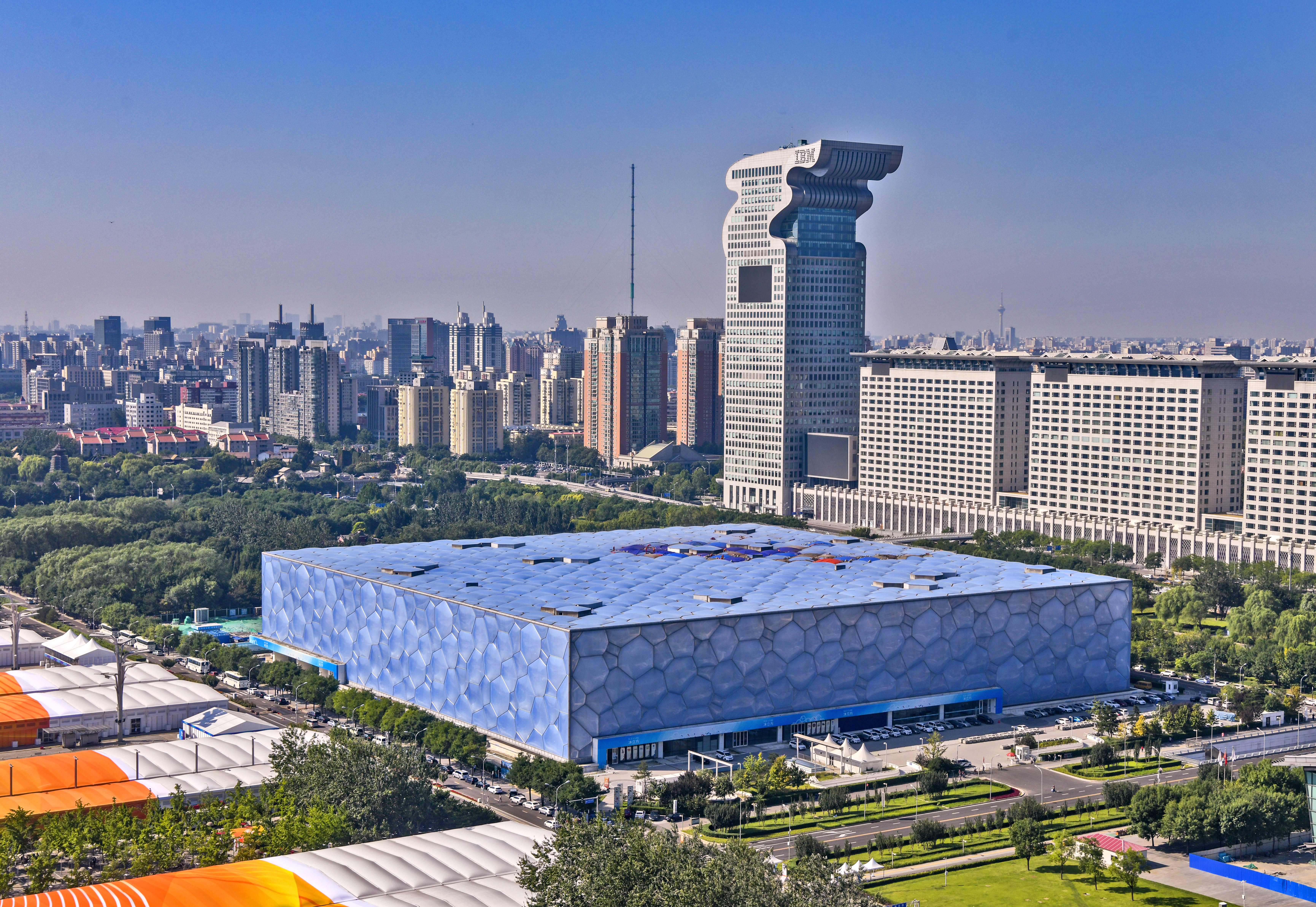
The National Aquatics Center (AKA the Water Cube/Ice Cube) is an iconic venue first built for the 2008 Beijing Olympics and later revamped for the 2022 Beijing Winter Olympics.
It is the only Olympic facility funded by compatriots from the Hong Kong Special Administrative Region, the Macao Special Administrative Region, Taiwan, and overseas Chinese.
Hailed as one of the "New Architectural Wonders of China," it is one of Beijing's new representative structures.
Established in August 2007, Beijing National Aquatics Center Co., Ltd., a wholly-owned subsidiary of Beijing State-Owned Assets Management Co., Ltd., is responsible for the operation and management of the National Aquatics Center.
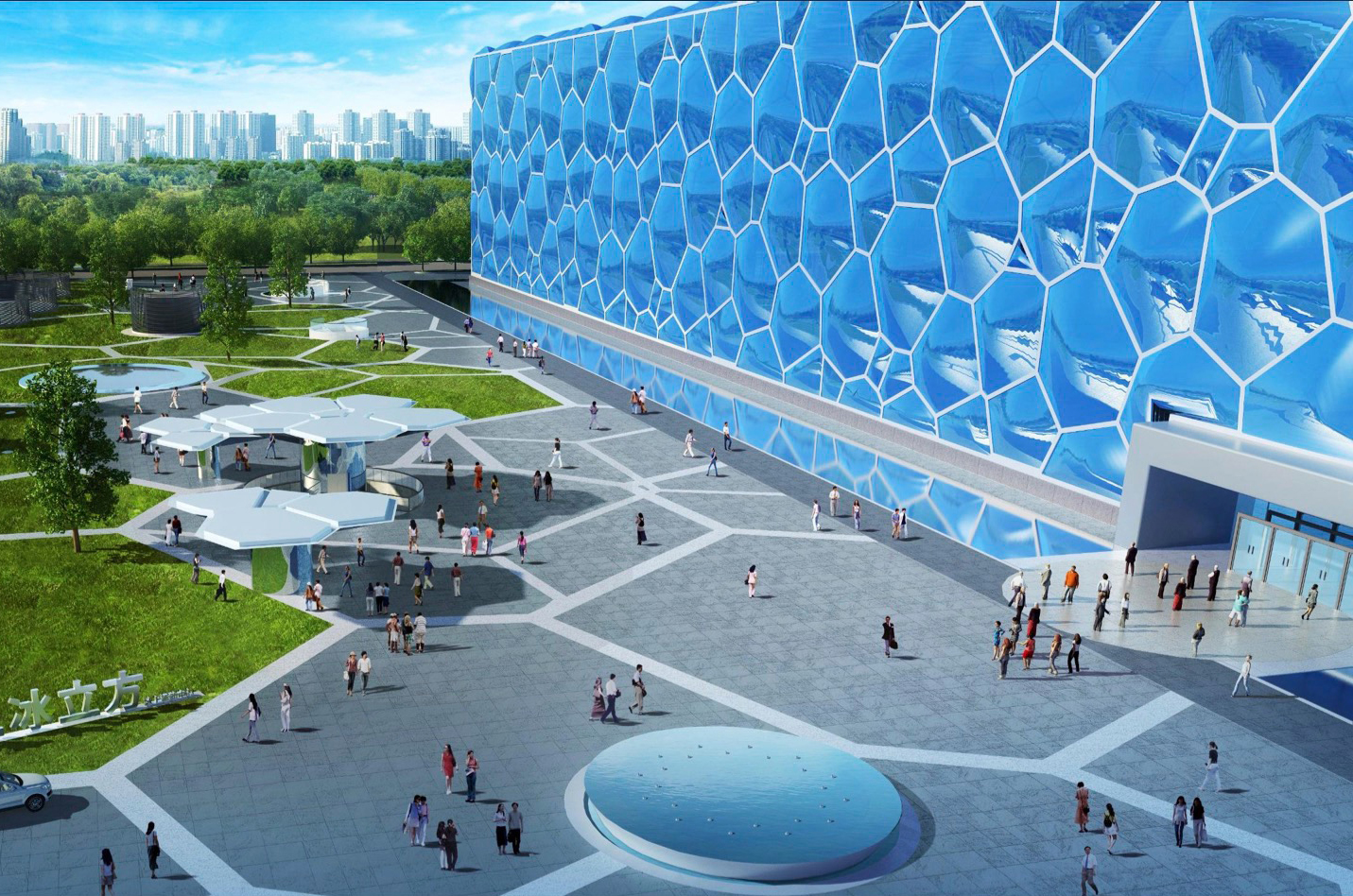
Following the guiding principle of "maintaining the operation of the Olympic venues well after the games" issued by the Beijing Municipal Committee of the Communist Party of China and the People's Government of Beijing Municipality, the Beijing National Aquatics Center Co., Ltd. aims to become "a world-class venue operation service provider." The team continuously explore how to make full use of the Olympic venue in a comprehensive, recycled, and sustainable manner to provide a Chinese solution for the reuse of the Olympic venues. In 2019, the company was awarded the annual "Sport and Sustainable Architecture" by the International Olympic Committee.
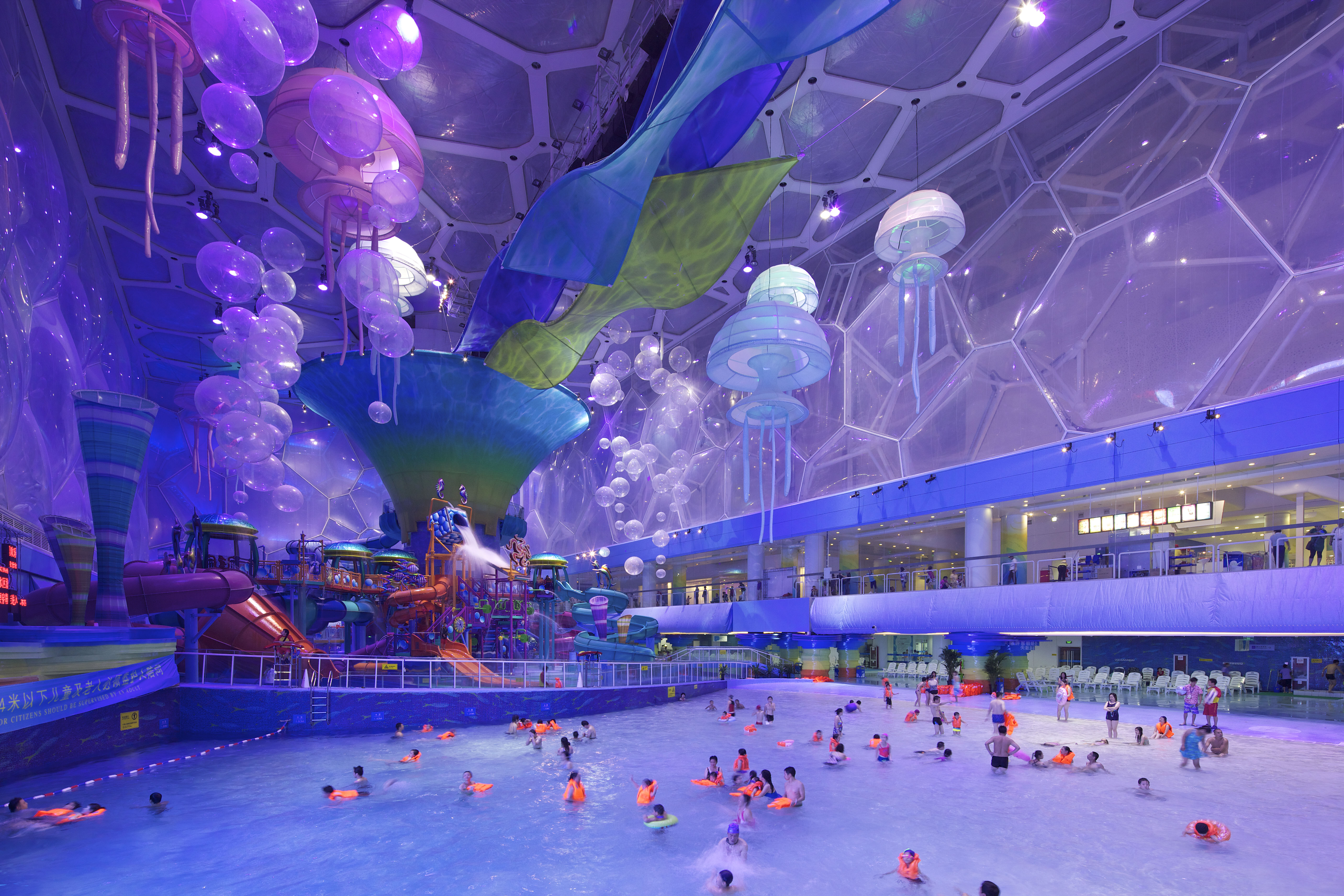
Since the opening of the National Aquatics Center after the games, it has continued to expand its business scope. It has since been converted to hold various sports events, tours, large-scale activities, market development projects, franchise events, a water park, and an ice rink. As of the end of 2020, the center had received 26 million tourists, hosted more than 1,600 events, and provided swimming services to about 2.6 million people.
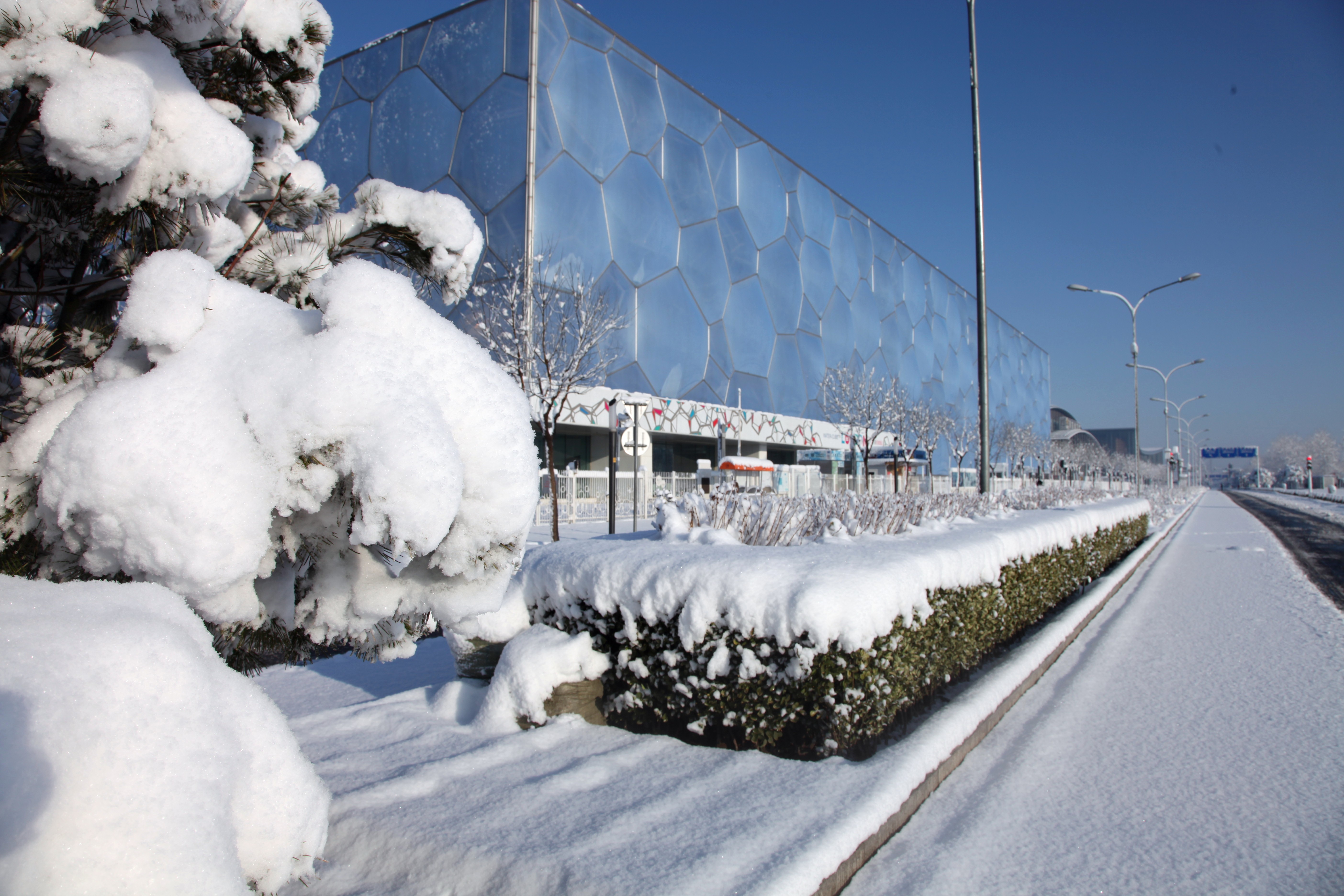
Following the venue retrofit for the 2022 Beijing Winter Olympics, the National Aquatics Center has achieved a comprehensive upgrade of its operational capabilities based on the "water-to-ice conversion" project, and successfully held curling competitions in 2019 and 2021. The center, as a a venue of both 2008 and 2022 Olympic Games, will continue to serve as a model for reusing Olympic venues after the games and innovate and develop the Chinese solution for the provision of services for water and ice events.
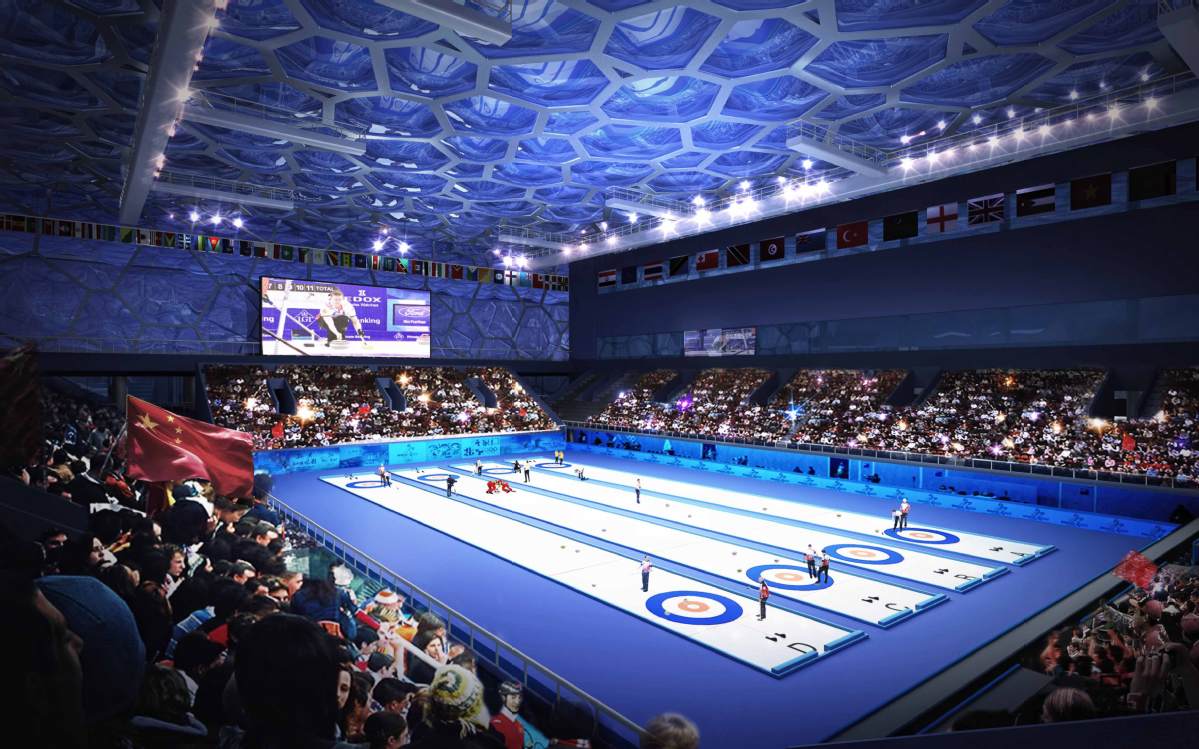
The 2008 Beijing Olympic Games' icon venue-Water Cube, has transformed into "Ice Cube", which is the world's first Winter Olympic Stadium to create curling ice in a swimming pool.
In the Olympic and Paralympic Winter Games, "Water Cube" is set to serve as the curling venue.
The construction of the convertible structure of the Water Cube was completed on Aug. 1.
Following on from the completion of the major construction, the Water Cube will now finish the renovation of sports lighting, ice-making, and air-conditioning systems in the curling competition venues in October, and will hold the China Youth Curling Championship in December to debut.
With the convertible structure of the ice rink and the removable ice-making system, the venue in the future will have both water and ice functions.
After the ice-making equipment and ice layer are removed, the ice rink can be reduced to a swimming pool.
According to the plan, water sports will take place in spring, summer, and autumn, and ice sports will happen during winter.
After the renovation, the venue will receive an intelligent system upgrade as well. The new intelligence system will effectively monitor the changes in the thermal, humid and lighting environment in the competition hall.
It will ensure that under any heat load conditions, the arena can react to changes and provide dynamic heating throughout the indoor environment. For example, when the ice surface temperature of curling track reaches minus 8.5 C, the temperature above 1.5 m of ice surface remains at 10 C, the relative humidity does not exceed 30%, and the temperature in the stands is 16 C to 18 C.
The Water Cube has also carried out a research project on architectural acoustics of the curling hall, in which the most advanced building sound-absorbing materials will be used. Athletes who are more than 40 meters apart at both ends of the track can communicate clearly through shouting.
Underground in the South Square of the Water Cube, the Ice Cube ice sports center is under construction at the same time and is estimated to begin trial operation next May.
The Ice Cube ice sports center will not only provide a competition guarantee for the Olympic and Paralympic Winter Games but also is expected to be used by 100,000 ice sports enthusiasts after the Games.
With 10 days to go before the 32nd Olympic Games open in Tokyo, China's elite athletes are making their final pushes toward the delayed sporting extravaganza.
Exactly 20 years ago, hundreds of millions of Chinese reveled in Beijing's successful bid for the 2008 Olympic Games, the first to be held in the world's most populous nation and the first in an Asian city since Seoul staged the 1988 Games.
As much of the world is still grappling with the COVID-19 pandemic, the Olympic flame symbolizes a light at the end of the dark tunnel for the Olympic family and the world as a whole.
For the Chinese, the Olympics represented a century-old dream which reached its climax 13 years ago when they staged a Games described as "truly exceptional" by then-International Olympic Committee (IOC) President Jacques Rogge.
But China's Olympic dream didn't stop in 2008. The country continues to contribute to the Olympic movement.
Century-long answer to three key questions
In 1908, "Tianjin Youth" magazine raised three questions: "When could China send an athlete to participate in an Olympic Games?" "When could China send a delegation to an Olympic Games?" "When could China host an Olympic Games?" For most of the last century, Chinese people tried hard to give answers to those three questions.
The first two questions found their answers not very long afterwards while the final puzzle was only solved almost a century after it was made.
At the Amsterdam Olympic Games in 1928, Song Ruhai, an observer from the All-China Sports Promotion Association, was the first Chinese to hear the word "Olympiad". He thus transliterated the word as "Wo Neng Bi Ya," which means "I can compete" in English.
Four years later, Liu Changchun was the first Chinese to make "Wo Neng Bi Ya" a reality. After 28 days of travel, the student from Northeast University arrived at the Los Angeles Games but found himself eliminated in the men's 100m preliminaries. In 1936, some 140 Chinese athletes participated in the Berlin Games.
In 1952, China dispatched a 40-member delegation to the Finnish capital of Helsinki to participate in the 15th Olympic Summer Games, marking the first time that the national flag of the People's Republic of China was raised at the quadrennial sports event.
It was not until the year 1984 that China made a significant impression at an Olympic Games, 52 years after Liu Changchun first took part. Chinese sharpshooter Xu Haifeng won the country's first-ever Olympic gold medal, and the Chinese team grabbed a total of 15 golds.
However, the search for an answer to the third question was painstaking. China failed in its first Olympic bid in 1993 and came back for its second try eight years later.
On July 13, 2001, then-IOC president Juan Antonio Samaranch announced during IOC's 112th session in Moscow that Beijing was awarded the 2008 Olympic Games, igniting the Chinese people's enormous enthusiasm for the Olympic movement and pride in their motherland's achievements.
"In the old days, Chinese people dared not imagine that this country could host the Olympic Games. It has become a reality along with the escalation of our country's status in the international community and our economic development. Beijing's success is a grand victory of our Party, our country and our people," said renowned Chinese basketball coach Mou Zuoyun after Beijing won the bid.
Mou had wanted to watch the Beijing Olympics, but he passed away in 2007.
He said that Beijing's bidding success could not be disconnected from outstanding achievements that China had made in terms of economy, culture, sports and other areas since the country's reform and opening up.
Late IOC member and vice president He Zhenliang was best known for his role in helping Beijing land the 2008 Olympics.
He could not hold back tears when receiving congratulations from other IOC members and his friends.
"I have no pity in life after this," he said, also attributing Beijing's bidding success to the overall development of the city and the country.
"Those members who supported us become more staunch, while those who were against Beijing's bid changed their minds."
Olympic preparation
13 years later, nobody can ignore the threat posed by the COVID-19 pandemic to the Olympic movement, especially with the Tokyo Olympics being postponed by one year.
However, like their counterparts in other places, Chinese athletes showcased an unswerving faith in striving for Olympic glory.
Two-time Olympic taekwondo gold medalist Wu Jingyu turns 34 on Tuesday. Starting her Olympic campaign by pocketing gold on home soil in 2008 and defending it in London four years later, she is ready to make a record fourth Olympic appearance as a female taekwondo athlete.
"I just knew that I had won the gold medal but had no idea of why I won it. When everyone cheers for you, you just have a sense of pride," Wu recalled.
Wu retired after finishing seventh at the Rio Olympic Games, and gave birth to her daughter in 2017.
After deciding to return to competition, Wu faced a race against time to rack up enough ranking points to qualify for Tokyo. Despite enormous challenges, she managed to secure her spot after finishing runner-up in the women's under-49kg category final at last year's World Taekwondo Grand Prix Final in Moscow.
"For a moment during that period, I even doubted whether I used to be a taekwondo athlete or not," Wu recalled.
But her faith in herself never faded. "No one knows what will happen next, but I always want to challenge the top podium."
Like Wu, veterans persevere in chasing their dreams out of pure love for the sport, while some others are set to debut at an Olympics that will be quite different from previous editions.
Scooping 28 out of 32 gold medals on offer since 1988, China is undoubtedly a powerhouse in table tennis. Anything less than a clean sweep of all available Olympic gold medals would be deemed a failure.
"That's a weight off my mind," said women's singles world No. 1 Chen Meng after being named in China's Olympic table tennis roster.
The Chinese team competed and trained overseas amid the initial COVID-19 outbreak early in 2020.
"We took care of and helped each other this year, and this united group has produced an excellent Chinese team," commented Qin Zhijian, secretary-general of the Chinese Table Tennis Association (CTTA).
In search of another title sweep, the team has finished its behind-closed-doors training in east China's city of Weihai.
"We have the ability and confidence in contending for all five golds, but there are challenges and risks as well, especially considering the pace and manner of preparation is quite different during the COVID-19 pandemic," noted CTTA president and sporting legend Liu Guoliang.
Consistent contribution to Olympic movement
Less than half a year after the Tokyo Olympic Games draws to a close, the world's attention will shift to Beijing, the first city to host both Summer and Winter Olympic Games.
In 2003, Li Jiulin was appointed chief engineer of the construction of the Beijing National Stadium the "Bird's Nest" for the 2008 Olympics at the age of 35.
"At that time, no one in China had the experience to deal with such complicated structural steel construction. None of the foreign experts believed that we could finish the job by ourselves," he recalled.
To solve endless problems, Li and his colleagues completed 13,520 construction drawings based on 150 designs and eventually built the Bird's Nest, the flagship venue of the 2008 Beijing Olympic Games.
After Beijing won the bid for the 2022 Winter Olympic Games, Li was tasked with being the chief engineer of the National Speed Skating Oval, known locally as the "Ice Ribbon," due to its distinctive facade.
As the only newly-built venue for ice events in the Beijing competition zone, the "Ice Ribbon" has an ice surface of around 12,000 square meters and can seat 12,000 spectators, making it the largest speed skating venue in Asia.
Except the "Ice Ribbon", China has made efforts to repurpose existing venues from when it hosted the Summer Olympics as 11 venues from Beijing 2008 have been renovated and upgraded for the 2022 Games.
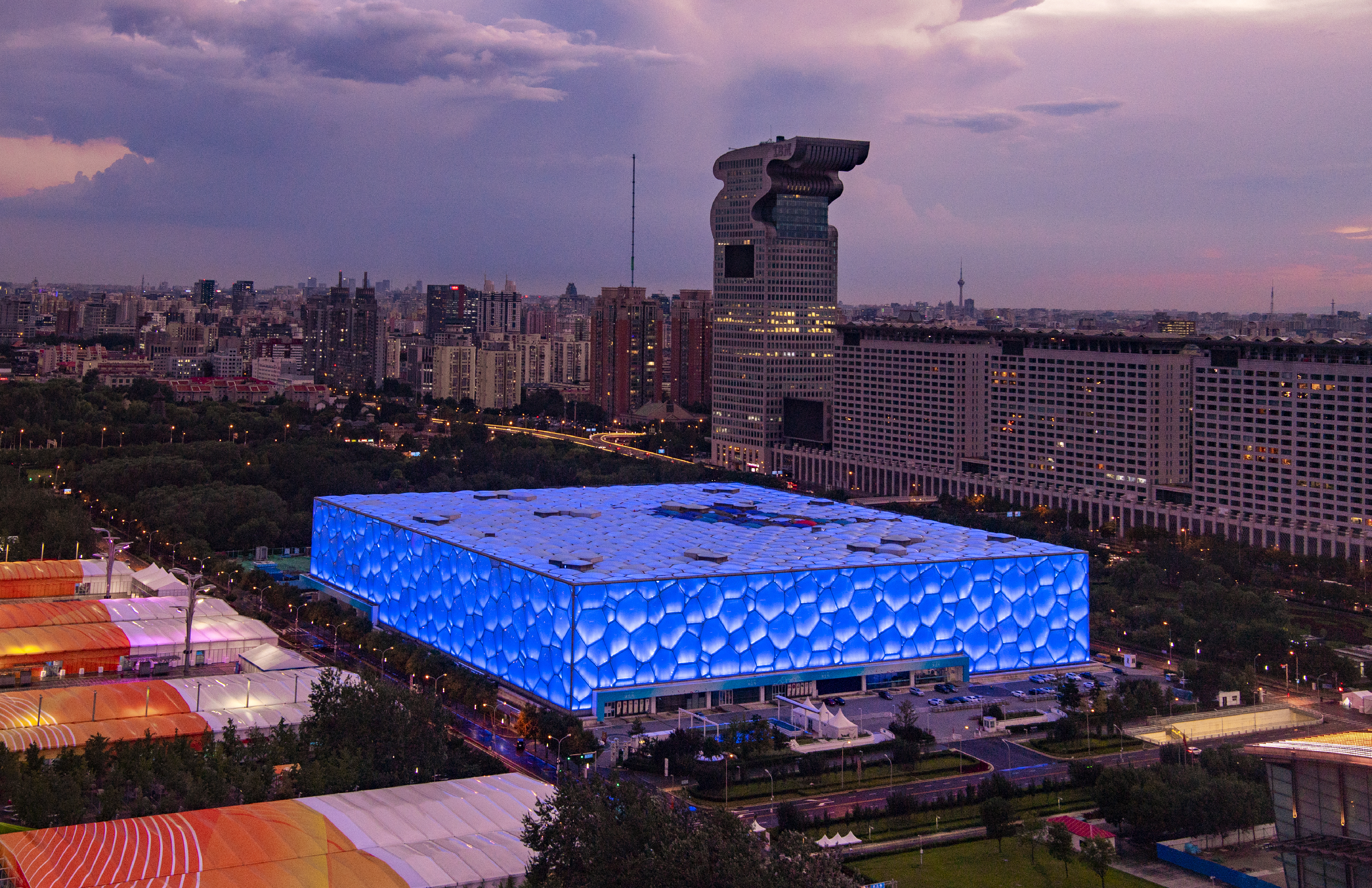
The National Aquatics Center, also known as the "Water Cube," hosted aquatic events during the Beijing Olympic Games and will stage the curling events for Beijing 2022. The National Indoor Stadium will be used for ice hockey, and the "Bird's Nest" is the planned venue for the opening and closing ceremonies.
IOC President Thomas Bach has lavished praise on the Beijing 2022 strategies. "Beijing is making the best out of this because the organizing committee there is using the great legacy of Beijing 2008 for the Olympic Winter Games Beijing 2022," he said.
On May 15, 2020, Beijing 2022 organizers released a sustainability plan that features three key themes: positive environmental impact, a new development for the region and better life for the people. They are supported by 12 sustainable development actions, under which there are 37 critical tasks and 119 specific measures.
"It (sustainability plan) is among the most developed in the history of the Olympic Games," said chairman of IOC Coordination Committee for Beijing 2022 Juan Antonio Samaranch Jr.
The BOCOG's Legacy Report released on June 23 outlines the pre-Games legacies achieved by Beijing 2022 in 13 areas, including the popularization and development of winter sports, urban transformation and upgrade, and regional transformation contributions to poverty alleviation.
Beijing 2022 will be held at a monumental moment, as China has realized its goal of building a moderately prosperous society in all respects.
According to the Legacy Report, a record 224 million Chinese people participated in ski and skating activities during the 2018/19 winter season, approaching the country's objective of involving 300 million Chinese people in winter sports.
In terms of urban upgrades and post-games sustainability, BOCOG has renovated and upgraded six venues from Beijing 2008 Games venue legacies to accommodate winter sports, and all permanent venues have sporting and social legacy plans for post-Games usage.
Over one million people at home and abroad have applied to volunteer during the 2022 Olympic and Paralympic Games, further evidence of the legacy and spirit of volunteerism stemming from the 2008 Olympic Games.
China has built an increasingly closer connection with the Olympic movement over the last 20 years and is set to play an ever more prominent role going forward.
Public Welfare Awards
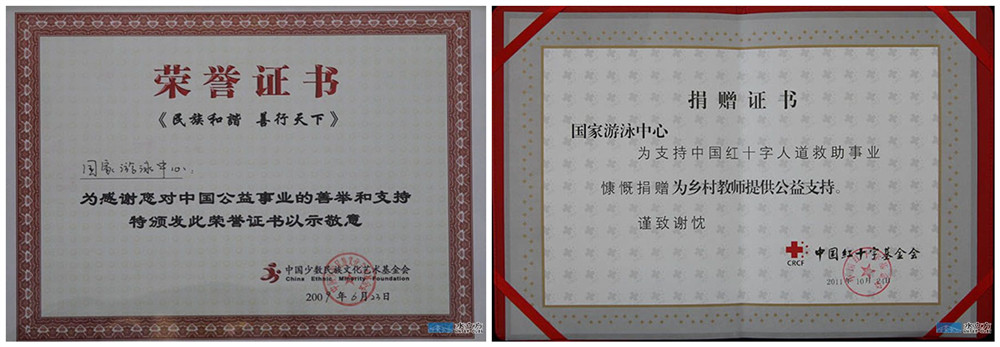
Certificate of Honor issued to the Water Cube on June 22, 2007, by the China National Culture Foundation for its kindness and support for China's public welfare undertakings (left)
Certificate of Donation issued to the Water Cube on October 24, 2011, by the Chinese Red Cross Foundation for its support of rural teachers (right)
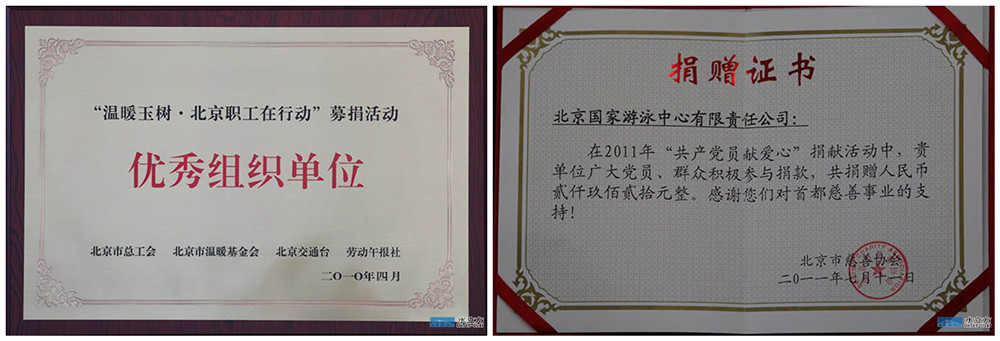
Outstanding Organization Award offered to the Water Cube in April, 2010 for the "Warm Yushu: Beijing Workers in Action" donation event (left)
Certificate of Donation issued to the Water Cube on July 17, 2011, by the Beijing Charity Association (BCA) for its support of the charity (right)
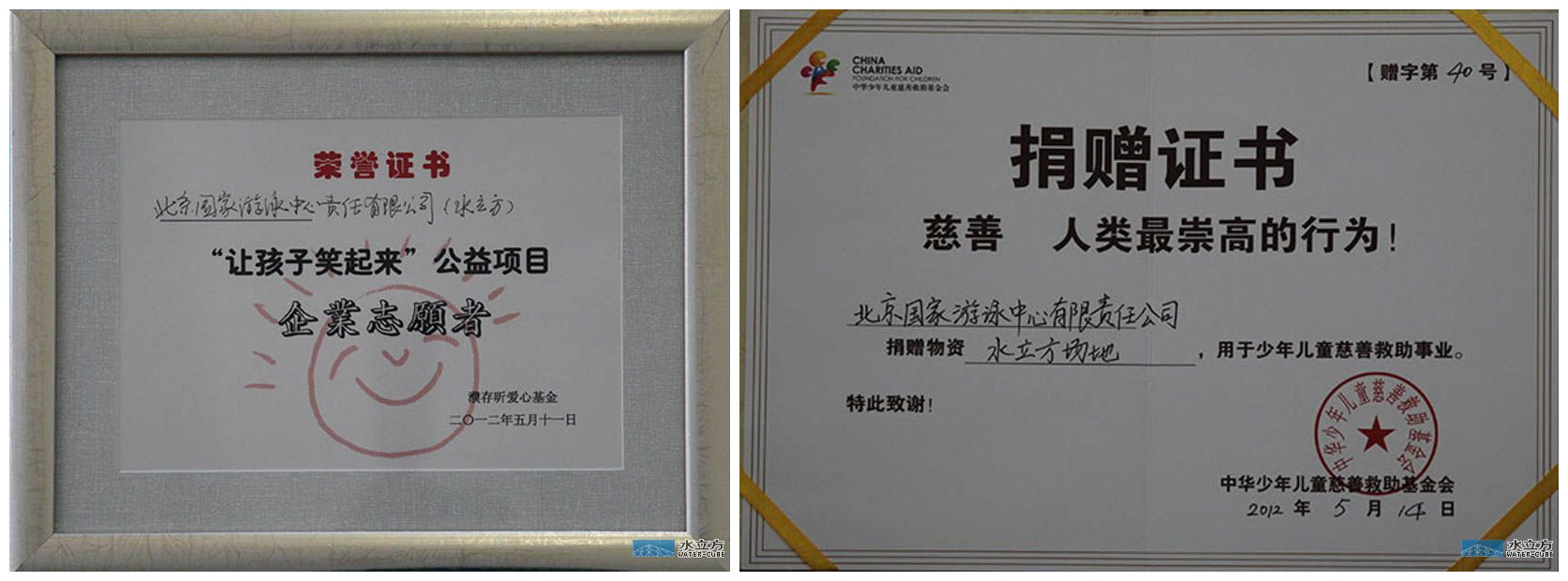
Enterprise Volunteer award for the public welfare project "Let the Children Smile" offered to the Water Cube in May, 2012 (left)
Certificate of Donation issued to the Water Cube on May 14, 2012, by the China Charities Aid Foundation for Children (CCAFC) for its provision of the venue for the children's charity (right)
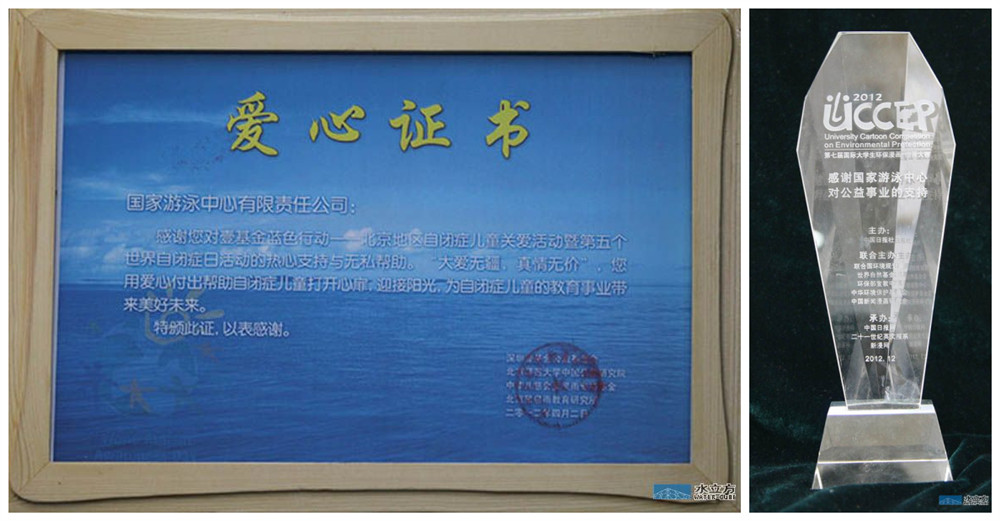
Certificate of Honor, awarded to the Water Cube on April 2, 2012, for its kindness and support for the Fifth World Autism Day event (left)
A trophy awarded to the Water Cube by China Daily for its charitable support (right)
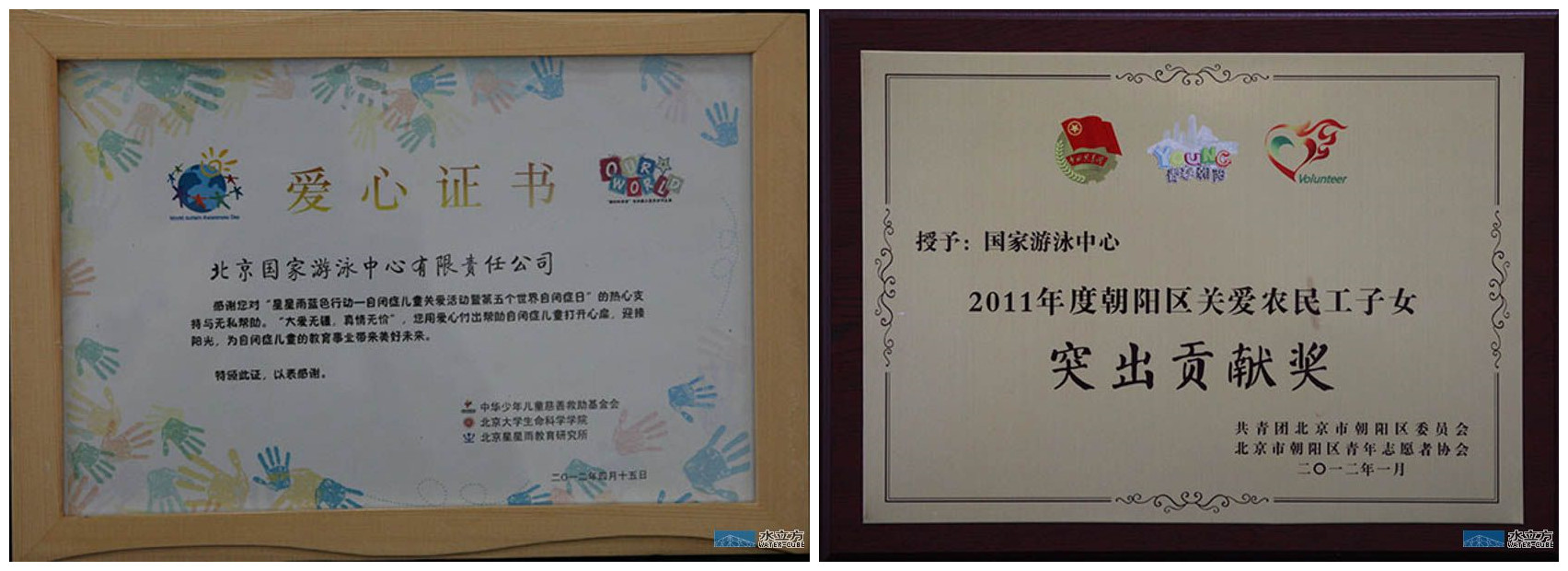
Certificate of Honor, awarded to the Water Cube on April15, 2012, for its kindness and support for the Fifth World Autism Day event (left)
Outstanding Contribution Award of the year (2011) for Chaoyang District, awarded to the Water Cube for its support of migrant workers'children (right)
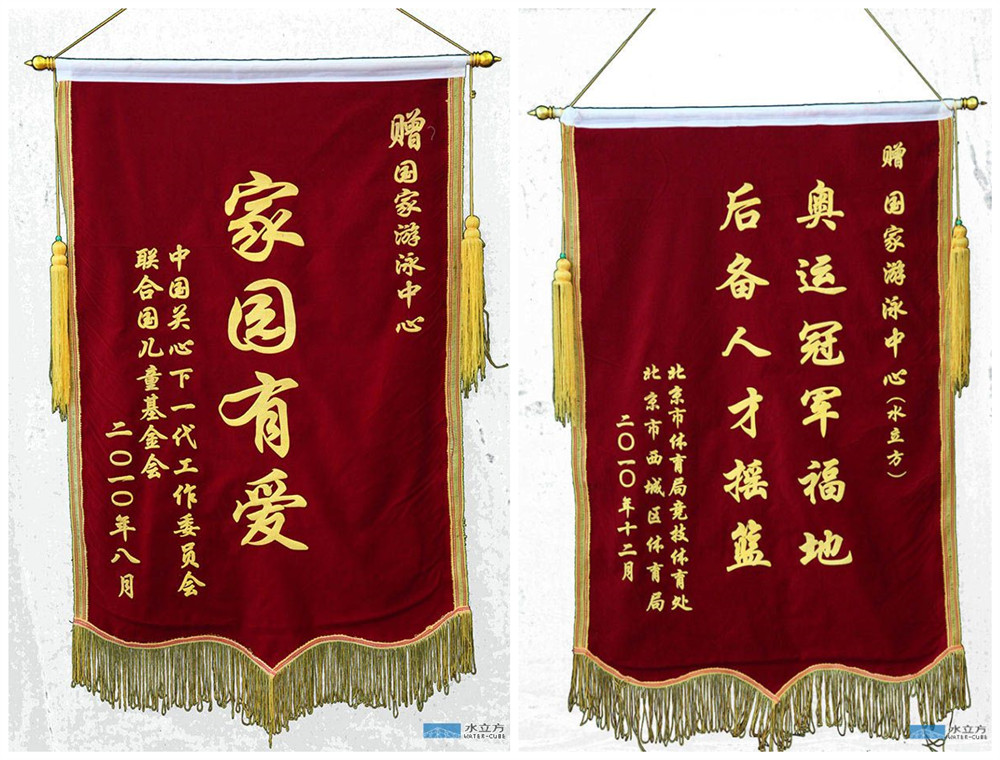
The Water Cube is granted the title "Home with Love" in August, 2010 (left)
The Water Cube is granted the title "The Blessing Land for Olympic Champions and the Cradle of Reserved Talents" in December, 2012 (right)

The China Great Home Action's "Caring and Co-construction Unit" award to the Water Cube in July, 2011 (left)
Certificate of Honor, awarded to the Water Cube on November 22, 2012, by the China Environmental Protection Foundation (CEPF) for its active participation in the "Golden Sun New Energy Charity Project" (right)
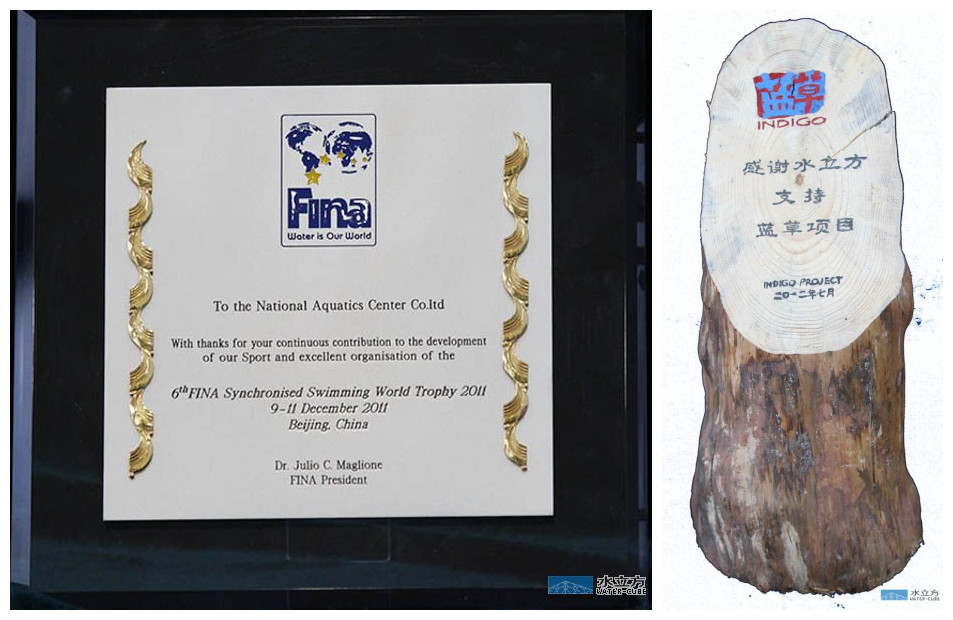
Management Awards
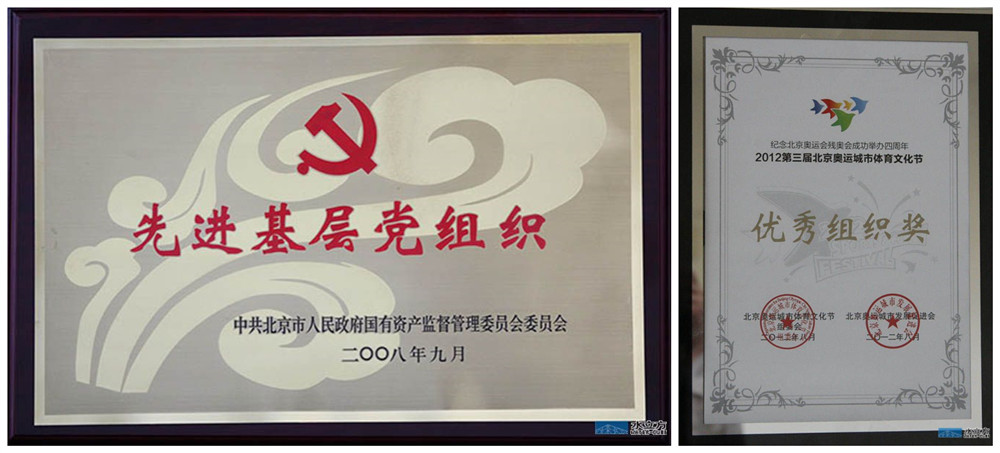
Advanced Primary-Level Party Organization award offered to the Water Cube in September, 2008 (left)
2012 Excellent Organization Award of the 3rd Beijing Olympic City Sports and Culture Festival (right)
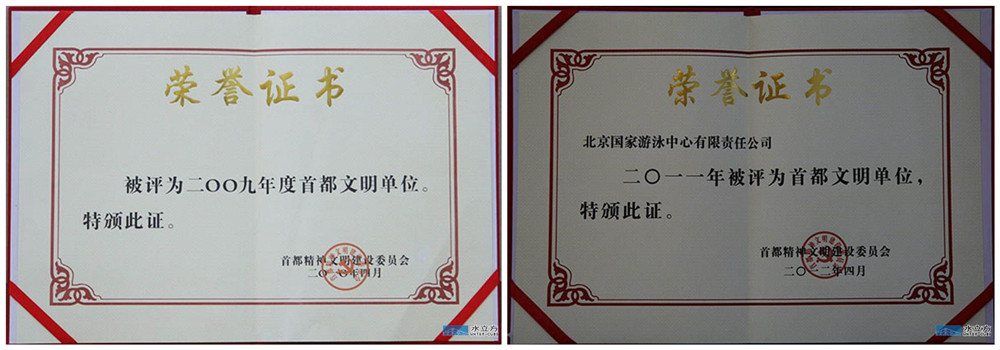
2009 Capital Role Model in Ethical and Cultural Progress (left)
2011 Capital Role Model in Ethical and Cultural Progress (right)
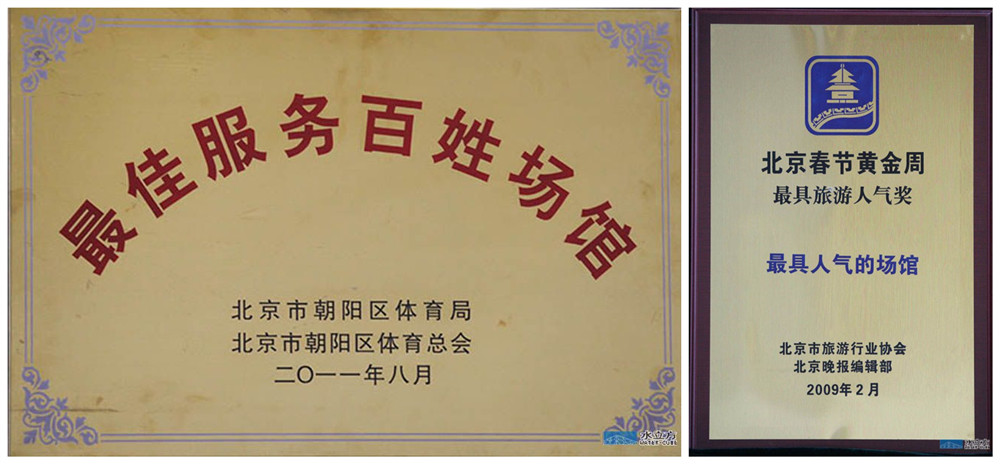
Best Venue for Public Services to the People offered to the Water Cube in August, 2011 (left)
Most Popular Venue of the Spring Festival Golden Week in Beijing offered to the Water Cube in February, 2009 (right)

Capital Role Model in Ethical and Cultural Progress (left)
The First "Top Ten New Tourist Brand Names of Beijing" Award offered to the Water Cube in June, 2010 (right)
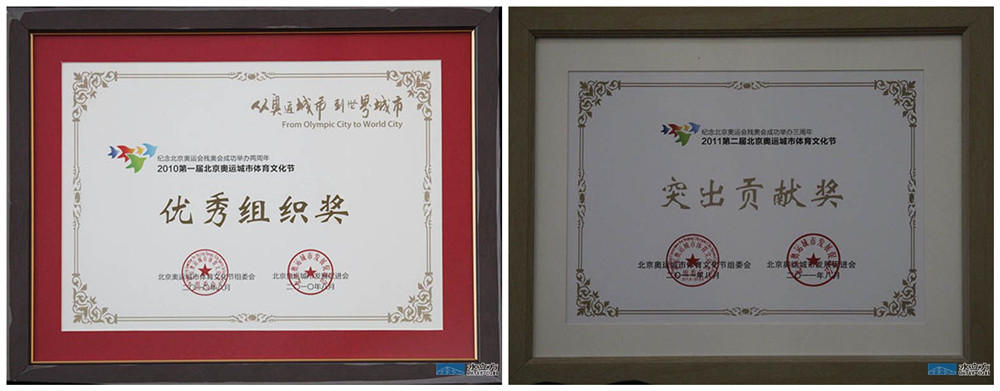
2010 Excellent Organization Award of the First Beijing Olympic City Sports and Culture Festival (left)
2011 Outstanding Contribution Award of the Second Beijing Olympic City Sports and Culture Festival (right)
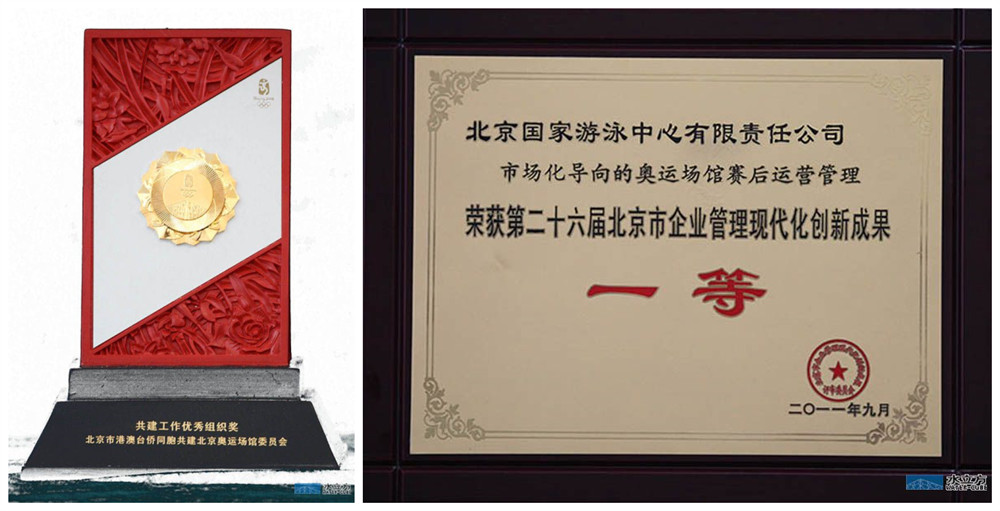
Excellent Organization Award in Crucial Work offered to the Water Cube by the Beijing Olympic Venue Co-construction Committee of Hong Kong, Macao, and Taiwan Compatriots and overseas Chinese (left)
The First Prize of the 26th Beijing Enterprise Innovation Achievements of Modern Management offered to the Water Cube in September, 2011 (right)
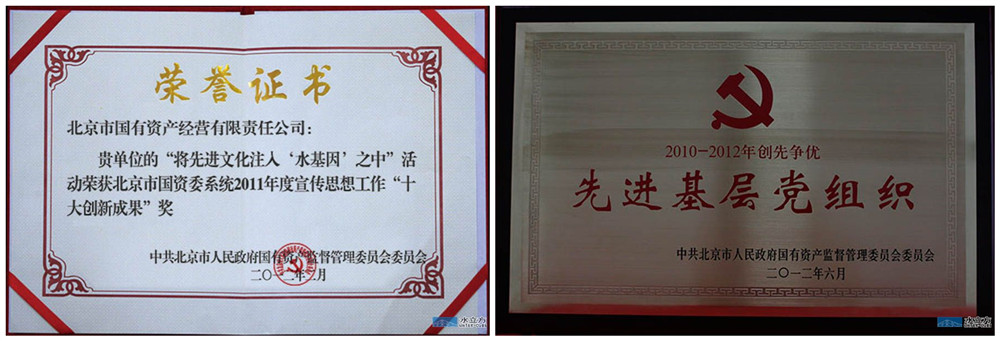
2011 "Top Ten Innovative Achievements" Award for publicity, by the State-owned Assets Supervision and Administration Commission of People's Government of Beijing Municipality (left)
2010- 2012 Advanced Primary-Level Party Organization in "Striving for Excellence" activity (right)
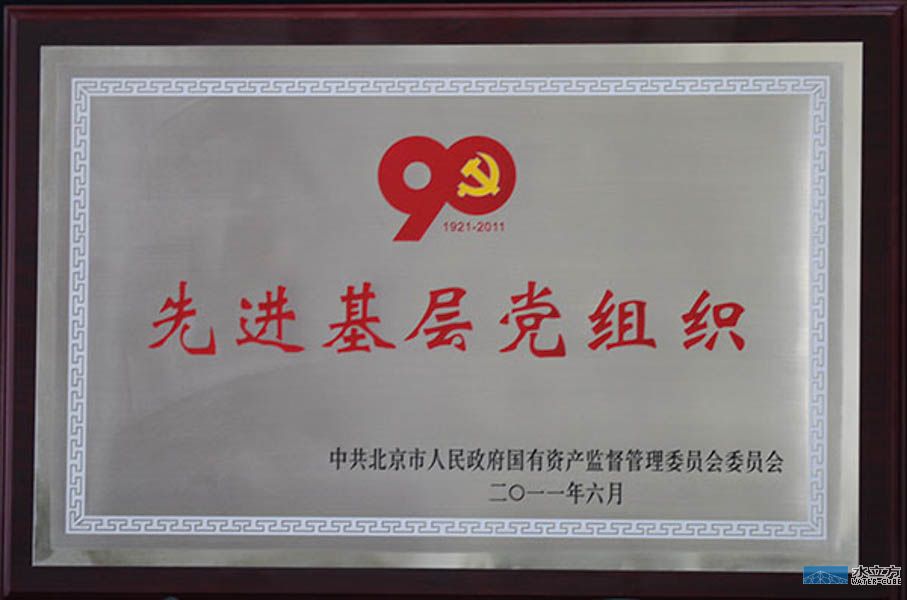
Advanced Primary-Level Party Organization award offered to the Water Cube in June, 2011, by the State-owned Assets Supervision and Administration Commission of People's Government of Beijing Municipality
_ueditor_page_break_tag_Architectural Awards
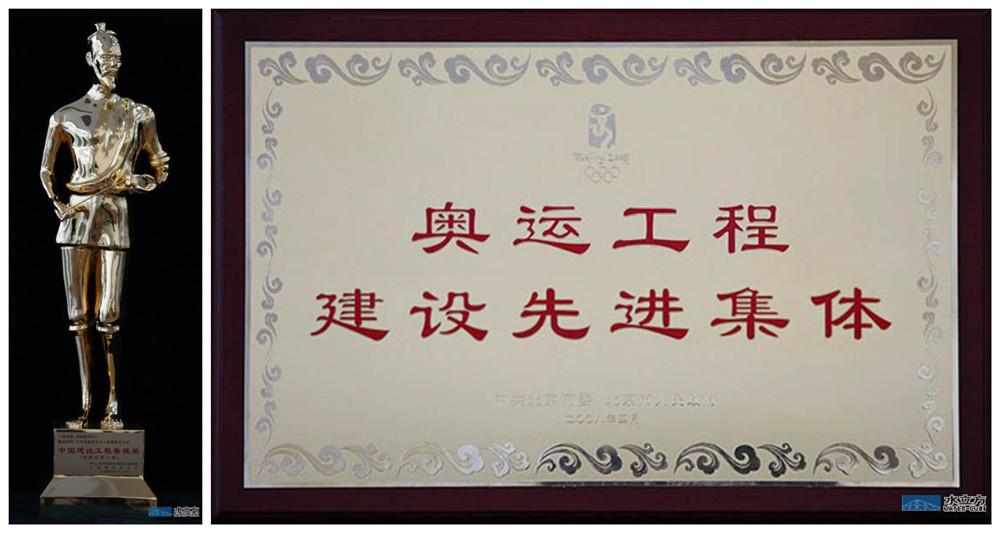
Exemplary Organization of Olympic Project Construction awarded to the Water Cube in April, 2008
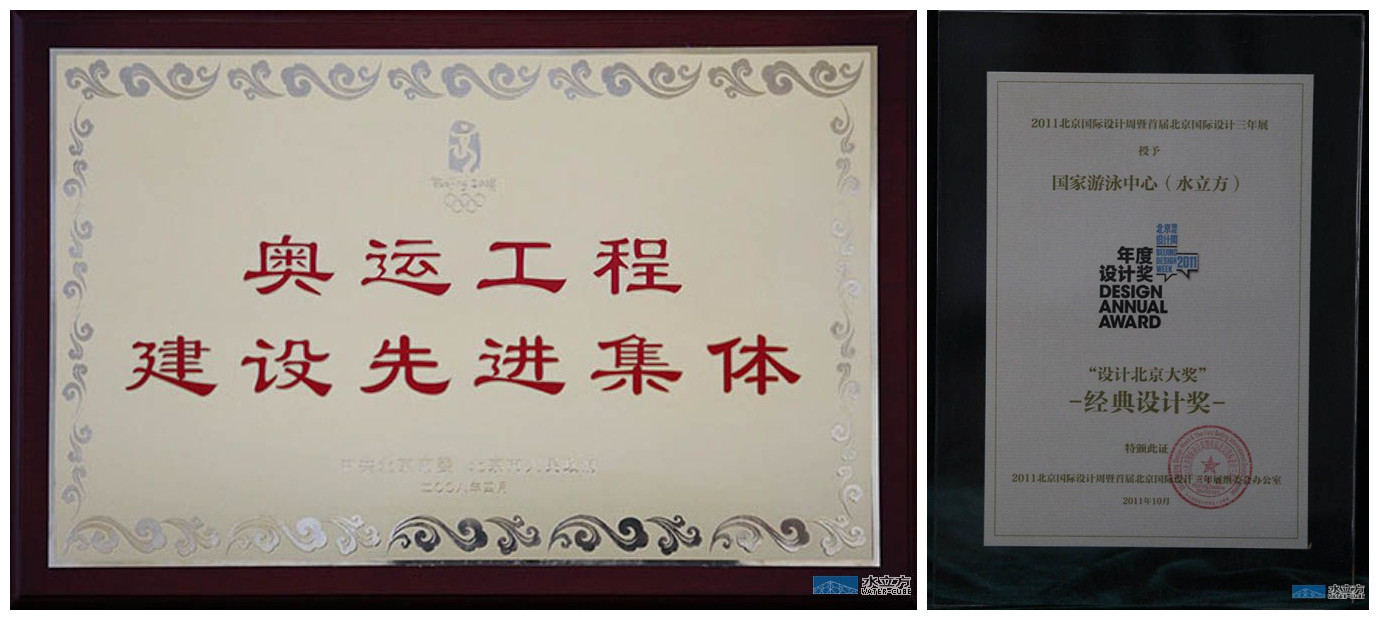
Exemplary Organization of Olympic Project Construction awarded to the Water Cube in April, 2008 (left)
2011 Classic Design Award for Beijing International Design Week (right)
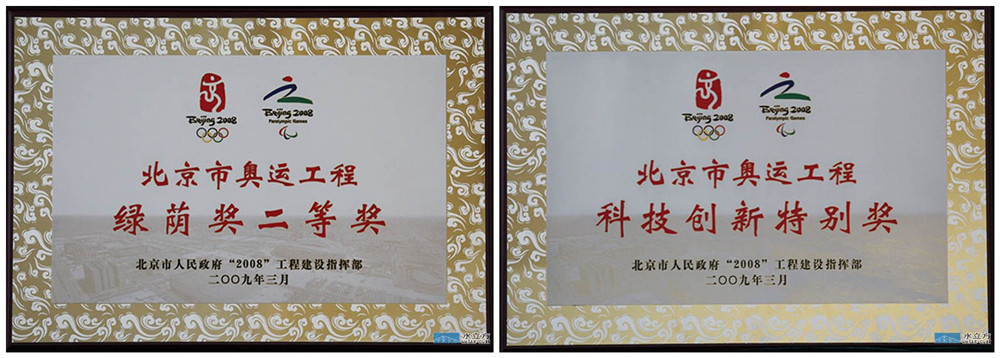
The Second Prize of Beijing Olympic Project "Green Shade Award" awarded to the Water Cube in March, 2009 (left)
The Special Award for Scientific and Technological Innovation of Beijing Olympic Project awarded to the Water Cube in March, 2009 (right)
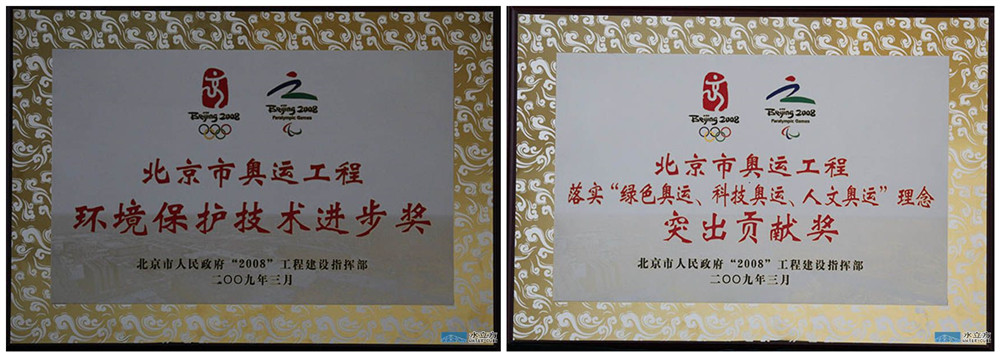
The Technological Progress Award for Environmental Protection of Beijing Olympic Project awarded to the Water Cube in March, 2009 (left)
Outstanding Contribution Award for the implementation of "Green Olympics, Sci-Tech Olympics, and Humanistic Olympics" concept of Beijing Olympic projects awarded to the Water Cube in March, 2009 (right)
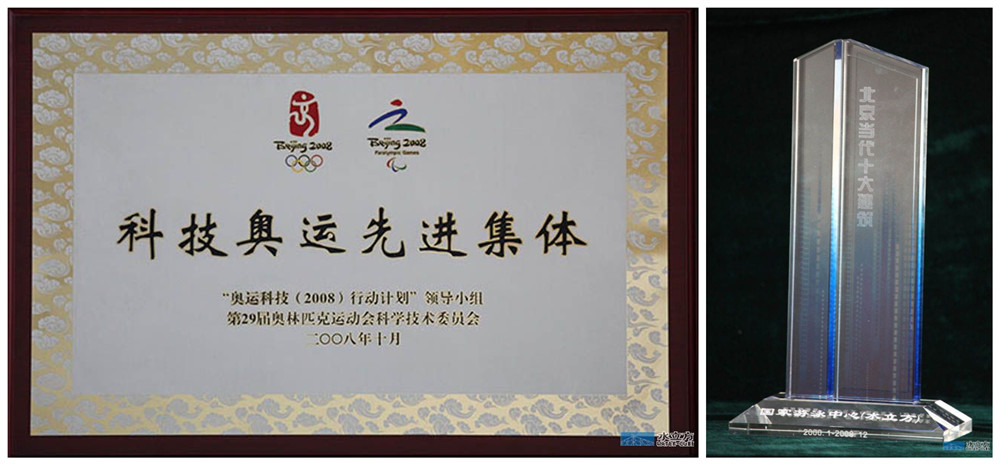
Exemplary Organization of Sci-Tech Olympics awarded to the Water Cube in October, 2008 (left)
Top Ten Contemporary Buildings in Beijing (right)
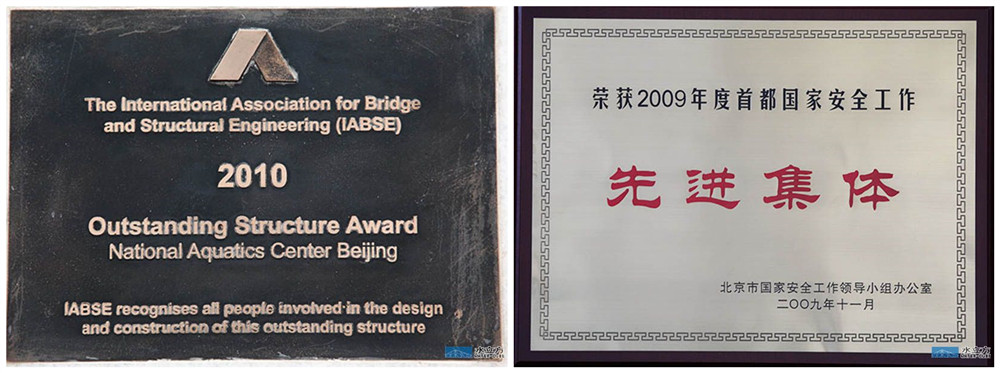
Outstanding Structure Award offered to the Water Cube in 2010 by the International Association for Bridge and Structural Engineering (IABSE) (left)
2009 Exemplary Organization of Capital's National Security Work (right)
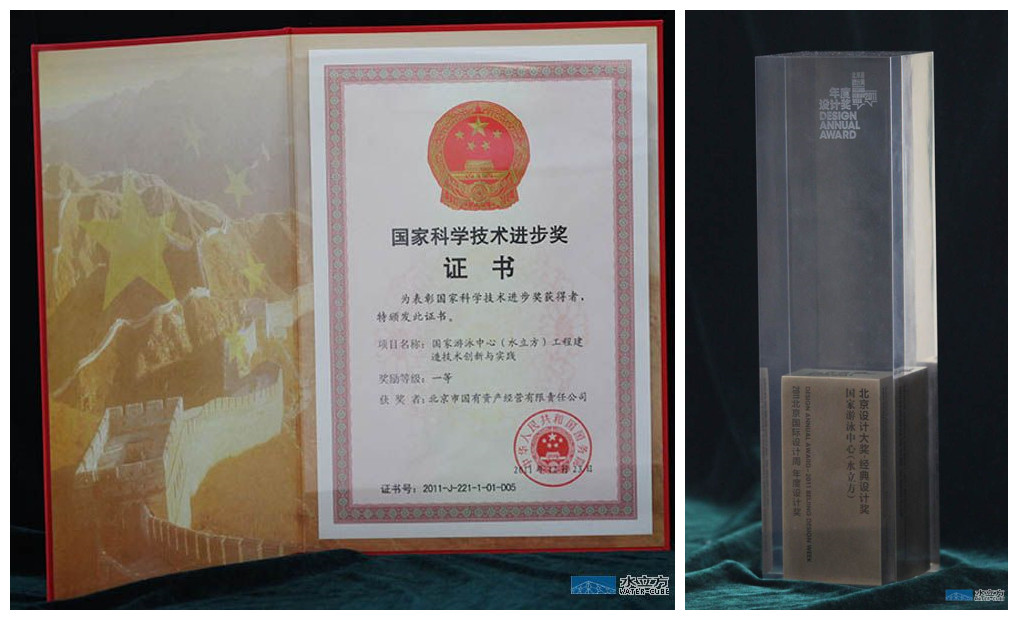
First Prize of the National Scientific and Technological Progress Award in 2011 (left)
Service Hotlines:
Visit: 010 - 84370112 / 84370116
Swimming: 010 - 84378912
Water Park: 010 - 84378966 / 84378963
Complaint:010 - 84370125
Venue Rental:010 - 84378842 / 84374571
Address: Olympic Park, 11 East Tianchen Road, Chaoyang District, Beijing
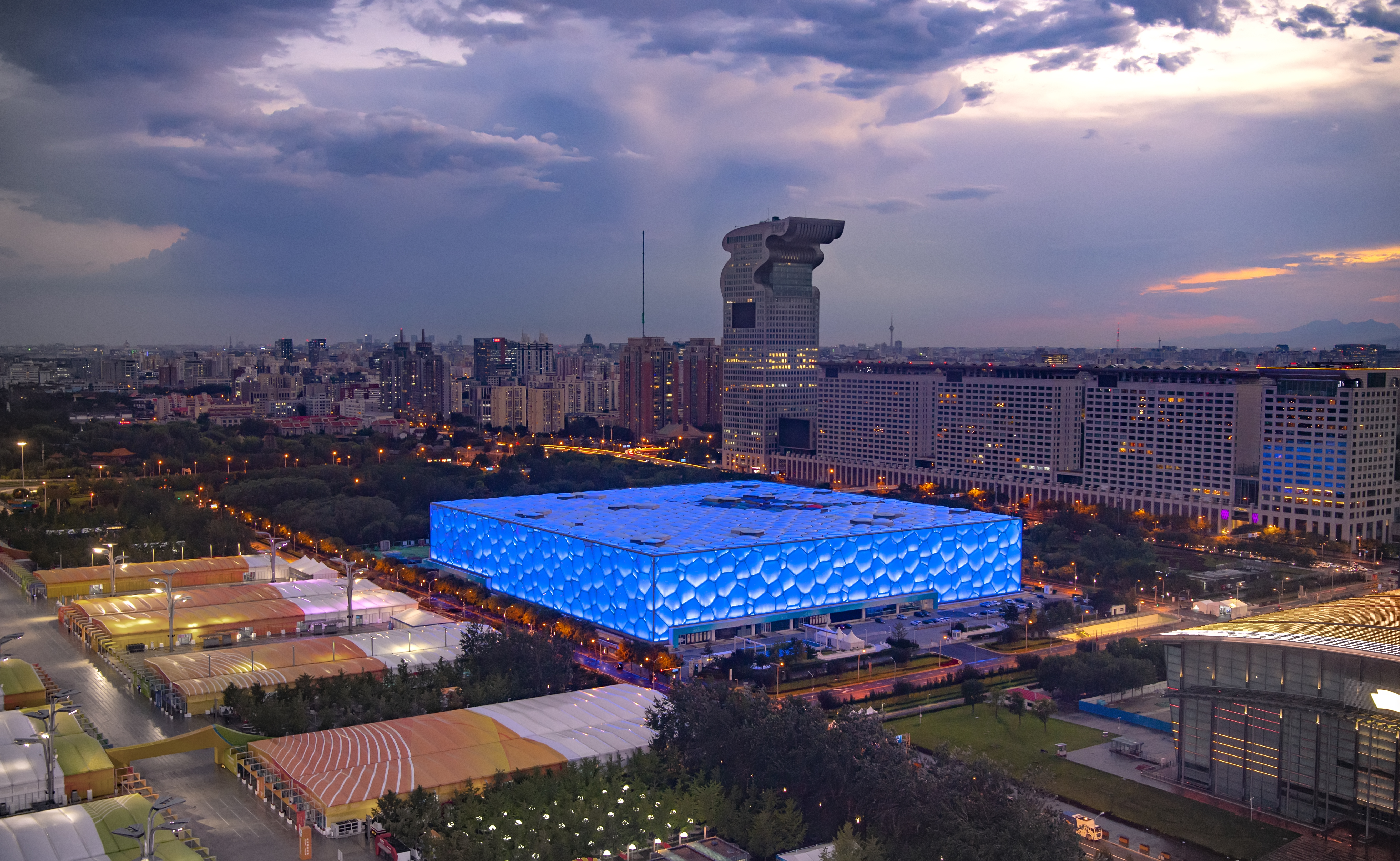
Competition Venue
The Olympic Competition Venue encompasses the Water Cube's core area. The hall is 116 meters long, 70 meters wide, and 30 meters high, covering 8,120 square meters in total. It has a swimming pool measuring 25 x 50 meters, with a depth of 3 meters, and a diving pool measuring 25 x 30 meters, with a depth of 4.5-5.5 meters.
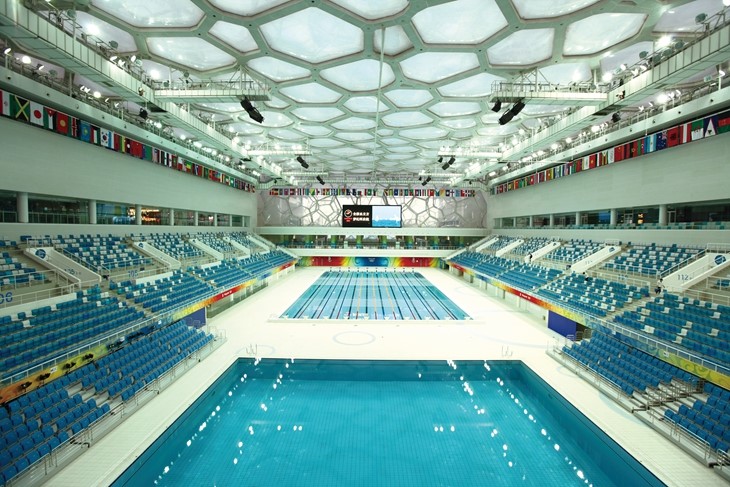
The stands feature more than 5,000 blue color seats, making them look like droplets of water from the pools below. The hall is well ventilated and combines natural light with a pleasing sound design for a pleasant, comfortable, and exciting experience.
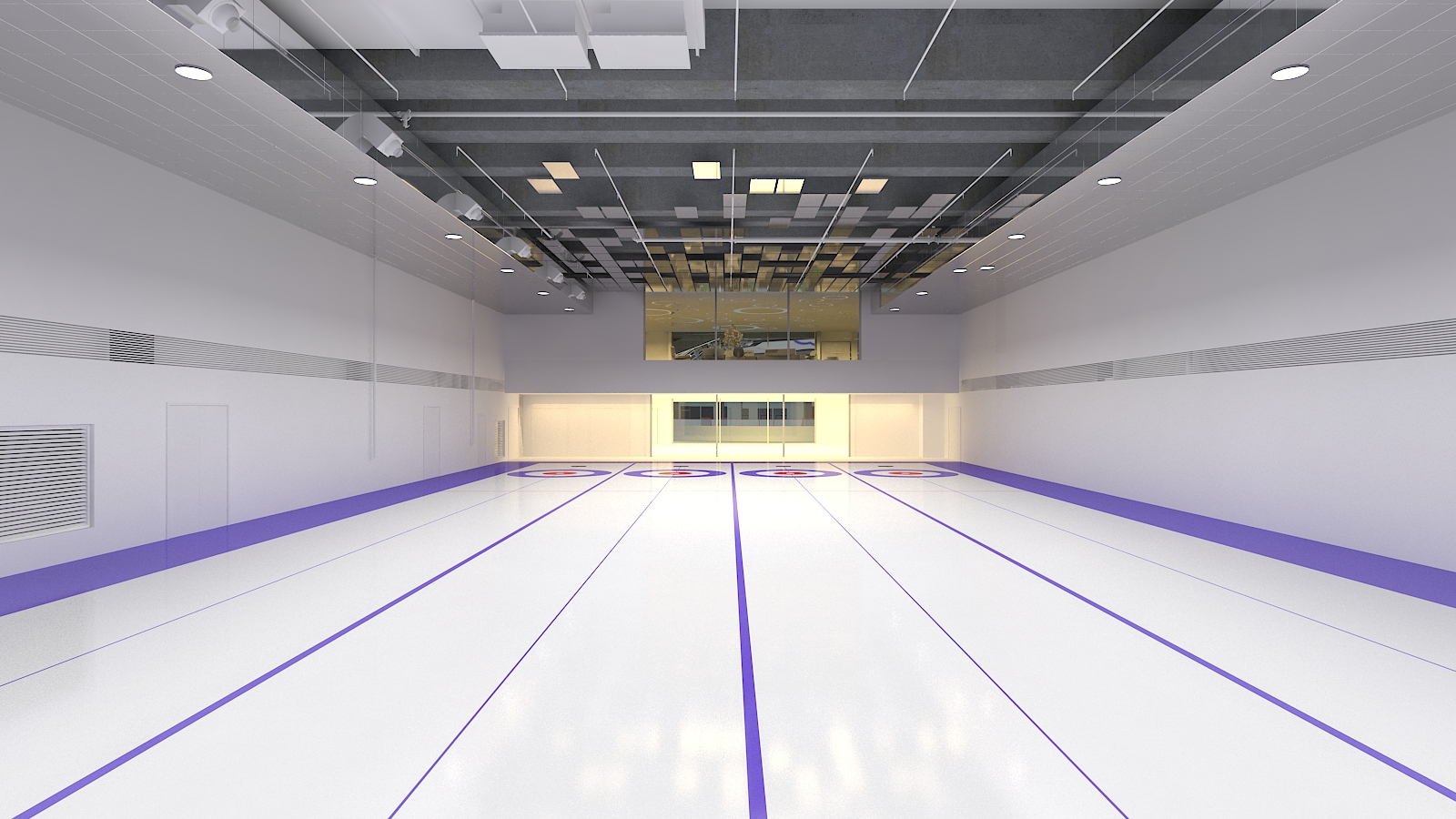
Warm-up Pool
The warm-up pool is built in full compliance with international competition standards and features both a deep area and a shallow area. The water is ozone-sterilized and supplemented by chlorine preparations to ensure optimal water quality. The ventilation system maintains a pool-side temperature of 22-26 degrees Celsius at all times.
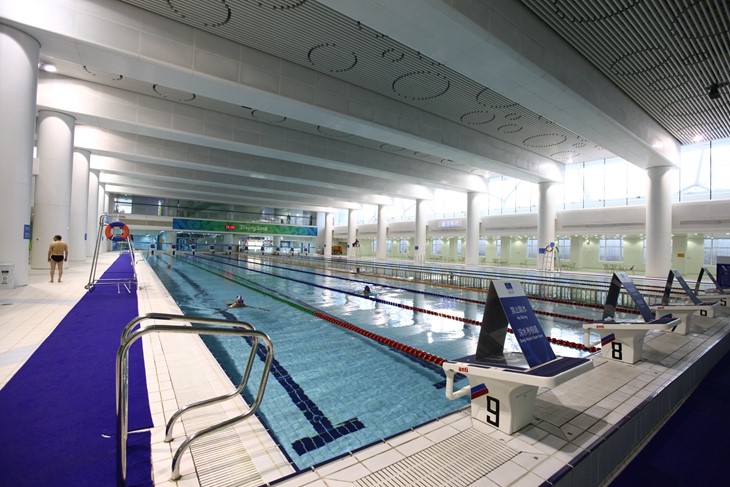
Multifunctional Hall
The Multifunctional Hall is situated at the comprehensive functional zone in the western flank of the Water Cube. The hall is 60 meters long, 40 meters wide, and 17 meters high, covering an area of 2,400 square meters and has three standard-sized indoor tennis courts. It has a seating capacity of approximately 1,000 as well as adequate space for exhibitions, providing a top-notch venue to host domestic and international culture and arts events.
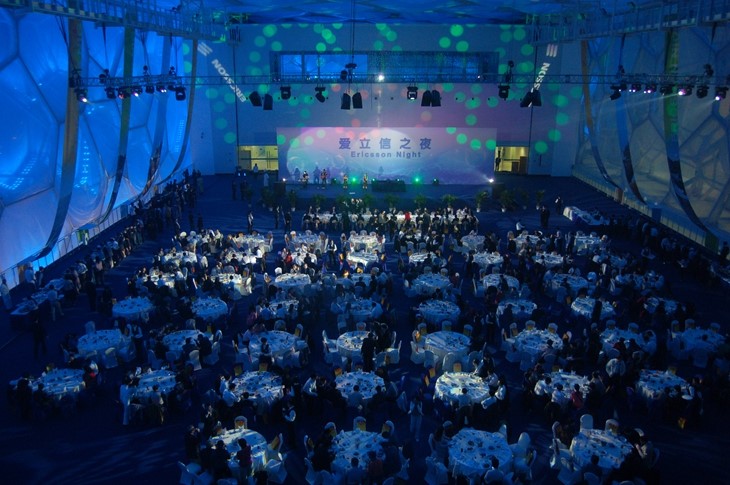
Water Park
As one of the largest Water Park in China and one of the world's most sophisticated indoor water parks, this venue features numerous recreational facilities and crystal-like water. Its location within the Water Cube also allows visitors to take in the charm of this massive and magical structure.
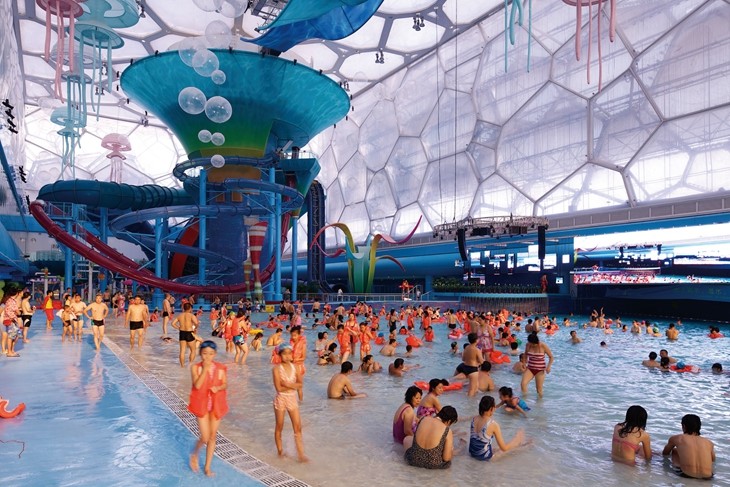
Exhibition in Commemoration of the Support to the 2008 Beijing Olympics from compatriots from Hong Kong, Macao, Taiwan, overseas Chinese, and foreign nationals of Chinese origin
This exhibition shows how the Water Cube was the only Olympic venue to be built using donations from compatriots fromHong Kong, Macao, Taiwan, and overseas Chinese. The exhibition's photography captures how the sons and daughters of the Chinese nation generously donated their money to the Beijing Olympics and for the construction of the Olympic venue. The pictures rekindled feelings of the kith and kin between the Chinese people.
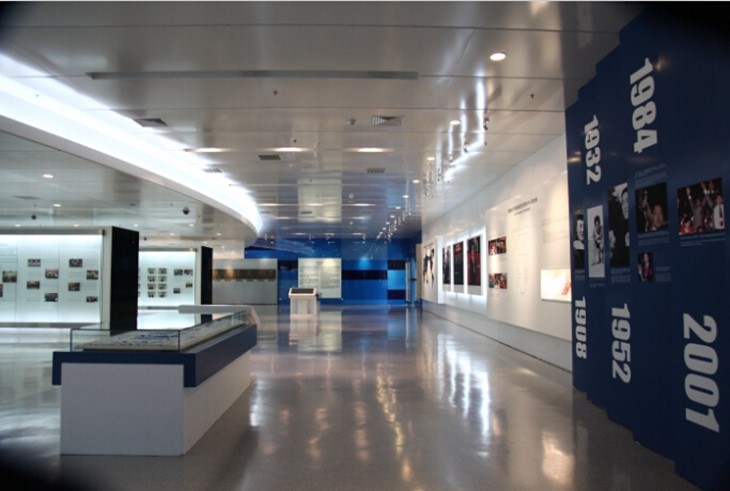
Exhibition in Commemoration of the Construction of the Water Cube, the Swimming Event Venue of the Beijing Olympics
This exhibition is situated on the fourth floor of the eastern side of the Water Cube's South Building. Covering nearly 300 square meters, the exhibition area boasts top-rate facilities and specialized and systemized services run by a professional operating team.
The exhibits closely relate to swimming and display their functions for humanistic and artistic exchange. The area is also home to commercial operations that span teaching, recreation, and communication activities.
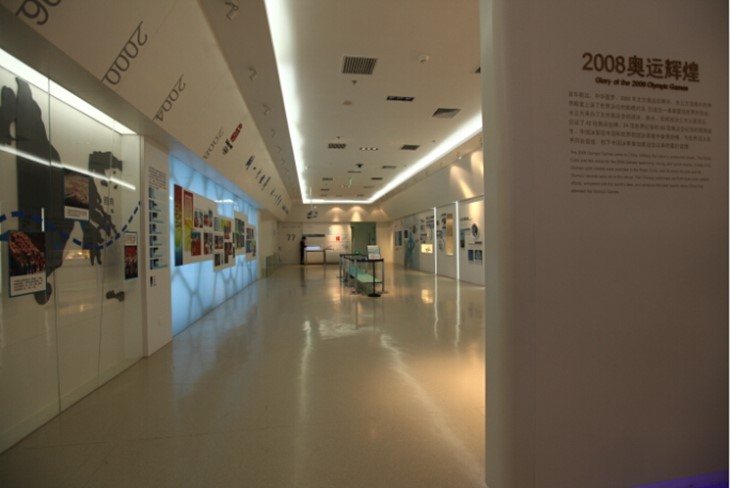
Water Cube Secret Exploration Hall
This hall reviews how the magic structure of the Water Cube was built. The rich array of objects and high-tech demonstrations help visitors discover the building's three main philosophies of "Ecology, Science and Technology, and Humanism" that the structure reflects and enables.
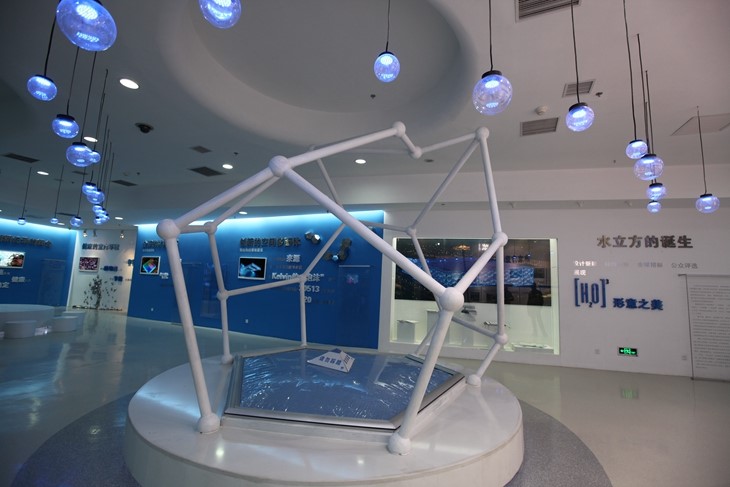
Water Droplet Theater
Spanning about 200 square meters, the Water Droplet Theater has 147 seats and can display 3D and HD laser films using advanced digital laser projection equipment. It can also be used as a conference room and a site for commercial promotions and other commercial and cultural activities.
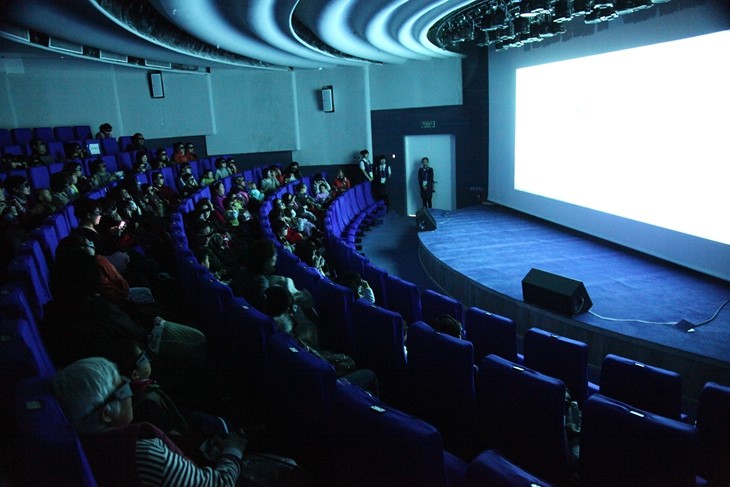
Side Buildings
TheWater Cube features two smaller buildings: a four-floor building on the southern side and a three-floor building on the north. They are replete with retail shops, coffee houses, a POP bar, a performance and film hall, rehearsal rooms, and small multi-functional halls.
They serve as sites for selling sportswear and gear, fashionable goods, and souvenirs, as well as sites for catering, coffee, tea, and other services for business talks and pleasure. They also offer a space for exhibitions, product promotion, conferences, parties, sports events, recreational activities, and high-end business talks.
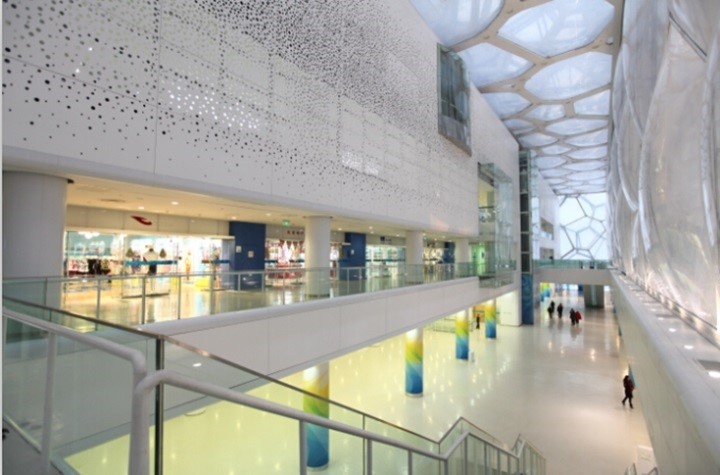
South Square
The South Square is an outdoor activity area on the southern flank of the Water Cube. Covering 10,000 square meters, it accepts bookings for large-scale public relations activities, the performing arts, and exhibitions.
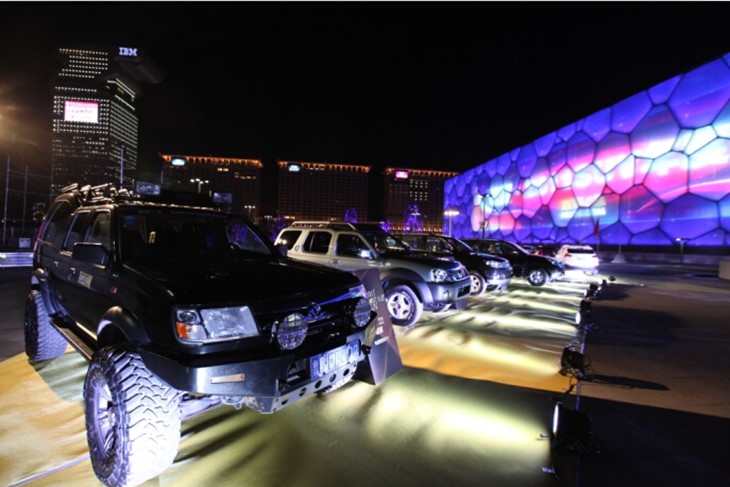
Opening Hours:
Peak season: 9 a.m - 10 p.m. (visitors must start to leave at 9:30 p.m.)
Off-peak season: 9 a.m. - 7 p.m. (visitors must start to leave at 6:30 p.m.)
Working Hours of the Box Office:
Peak season: 9 a.m. - 8:50 p.m. (no admission after 9 p.m.)
Off-peak season: 9 a.m. - 5:50 p.m. (no admission after 6 p.m.)
Specific working times shall be subject to opening times of the venue.
Ticket prices:
Full price: RMB 30 yuan per ticket
Half price: RMB 15 yuan per ticket
Inquires: 010 - 84370112/84370116
Complaints and rescue: 010 - 84370125
Private guided tours: 010 - 84370117
For tourists:
1. Ticket prices for tourists:
Full price: RMB 30 yuan per ticket
Half price: RMB 15 yuan per ticket
2. Half-price tickets apply to:
People between the age of 60 and 64 with a valid "elderly certificate" or valid ID card; soldiers (including armed policemen) in active service with a valid certificate; university, middle school, and primary school studentswith a valid "student card."
3. Complimentary visits apply to:
Water Cube donators with a valid document of proof; retired cadres with a valid "retirement certificate"; people above the age of 65 with a valid document; people with disabilities with a valid document; children aged or under 6, or of or below 1.2 meters tall and accompanied by an adult with a ticket.
Notes:
Documents mentioned above must be issued by relevant departments within the People's Republic of China (including Hong Kong, Macao, and Taiwan) for individuals to enjoy discounted entry.
Those who enjoy discounted tickets must show the relevant original documents when buying tickets and at the entry check-in point. Those who enjoy complimentary visits must show the relevant documents at the check-in point.
Groups entitled to the above preferential policies may dial hotlines 010 - 84370112 and 84370116 for consultation and booking.
Beijing National Aquatics Center Co., Ltd. reserves the right to the final interpretation of the preferential policies.
For travel agency tour groups:
1. Ticket prices for tour groups:
Full price: RMB 21 yuan per ticket
Half price: RMB 15 yuan per ticket
2. Ticketing instructions:
The assigned tour group leader or tour guide for each travel-agency-led group will be required to purchase group tickets at the group ticket office with their tour guide ID card and the group itinerary. Each group will be issued a group ticket. When purchasing discounted tickets, the travel agency must follow policy guidelines and provide the relevant documents.
3. Procedure for purchasing travel agency group tickets:
1). On the day of the visit, the tour guide must purchase tickets at the west window of the Water Cube with his or her tour guide ID card and the group itinerary. Fill out the invoice registration form if an invoice is required.
2). The tour guide must enter along with all group visitors through Gate 7 on the west side of the Water Cube. The group ticket and itinerary must be provided for inspection at the time of entry into the venue. The tour guide will gain free admission with the provision of his or her valid tour guide ID card.
Tour guide appointment:
Tel. for guide service: 010 - 84370117
Guide appointment: Groups must make an appointment three days before visitation; reception hours: 9 a.m.5 p.m.
Guide commissions: RMB 100 yuan per tour (Chinese), RMB 150 yuan per tour (English). Tours are subject to a time limit.
Visitor regulations:
1. Please buy tickets at authorized ticketing offices in order to ensure your legitimate rights and interests. Tickets are non-refundable.
2. All visitors must pass through a security check. Lighters, explosives, or inflammable substances and devices, knives, and other dangerous articles cannot be brought into the venue. Pets are not allowed inside the venue.
3. Visitors are requested to stay in the designated areas within opening hours. Visitors are not allowed access to non-public and office areas. Visitors shall be responsible and provide compensation accordingly in the case of accidents or damage.
4. Please do not mark, fold, or damage the ticket's QR code. In the event that the QR code cannot be recognized and the ticket holder cannot enter the venue, the ticket purchaser shall take responsibility.
5. Without permission, visitors cannot make, copy, or utilize any photographs and audio-visual materials related to the venue. Visitors may not use photographs or audio-visual materials related to the venue for any commercial purposes.
6. The entire venue is non-smoking. Please keep the venue clean and hygienic.
7. In case of the adjustment of opening hours, please visit the official website of the National Aquatics Center (www.water-cube.com) or the official WeChat for further details, or check for notices at the entrance. In case of large-scale events, please follow the venue's temporary arrangements.
8. In the case of swimming competitions or large-scale events, visitation to the competition hall will be suspended.
9. The Beijing National Aquatics Center Co., Ltd. reserves the final right to interpret the Visitor Regulations.
Parkling lot service hours: 6 a.m.-10 p.m.
Parking Fee: RMB 5 yuan per hour
Capacity: 200 vehicles (fewer than 200 during hours for large-scale events)
Note: The parking lot is only open to small vehicles (≤7 seats)
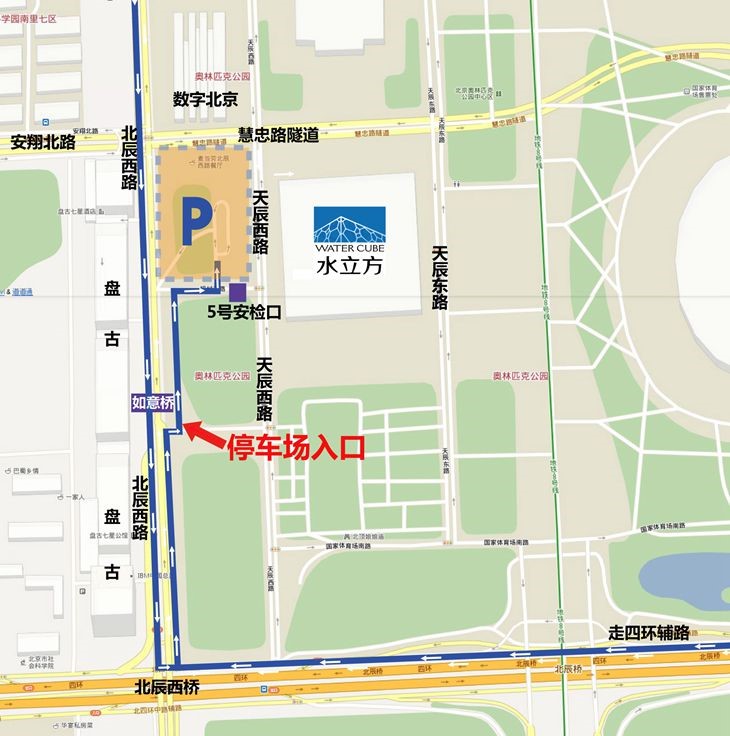
With 10 days to go before the 32nd Olympic Games open in Tokyo, China's elite athletes are making their final pushes toward the delayed sporting extravaganza.
Exactly 20 years ago, hundreds of millions of Chinese reveled in Beijing's successful bid for the 2008 Olympic Games, the first to be held in the world's most populous nation and the first in an Asian city since Seoul staged the 1988 Games.
As much of the world is still grappling with the COVID-19 pandemic, the Olympic flame symbolizes a light at the end of the dark tunnel for the Olympic family and the world as a whole.
For the Chinese, the Olympics represented a century-old dream which reached its climax 13 years ago when they staged a Games described as "truly exceptional" by then-International Olympic Committee (IOC) President Jacques Rogge.
But China's Olympic dream didn't stop in 2008. The country continues to contribute to the Olympic movement.
Century-long answer to three key questions
In 1908, "Tianjin Youth" magazine raised three questions: "When could China send an athlete to participate in an Olympic Games?" "When could China send a delegation to an Olympic Games?" "When could China host an Olympic Games?" For most of the last century, Chinese people tried hard to give answers to those three questions.
The first two questions found their answers not very long afterwards while the final puzzle was only solved almost a century after it was made.
At the Amsterdam Olympic Games in 1928, Song Ruhai, an observer from the All-China Sports Promotion Association, was the first Chinese to hear the word "Olympiad". He thus transliterated the word as "Wo Neng Bi Ya," which means "I can compete" in English.
Four years later, Liu Changchun was the first Chinese to make "Wo Neng Bi Ya" a reality. After 28 days of travel, the student from Northeast University arrived at the Los Angeles Games but found himself eliminated in the men's 100m preliminaries. In 1936, some 140 Chinese athletes participated in the Berlin Games.
In 1952, China dispatched a 40-member delegation to the Finnish capital of Helsinki to participate in the 15th Olympic Summer Games, marking the first time that the national flag of the People's Republic of China was raised at the quadrennial sports event.
It was not until the year 1984 that China made a significant impression at an Olympic Games, 52 years after Liu Changchun first took part. Chinese sharpshooter Xu Haifeng won the country's first-ever Olympic gold medal, and the Chinese team grabbed a total of 15 golds.
However, the search for an answer to the third question was painstaking. China failed in its first Olympic bid in 1993 and came back for its second try eight years later.
On July 13, 2001, then-IOC president Juan Antonio Samaranch announced during IOC's 112th session in Moscow that Beijing was awarded the 2008 Olympic Games, igniting the Chinese people's enormous enthusiasm for the Olympic movement and pride in their motherland's achievements.
"In the old days, Chinese people dared not imagine that this country could host the Olympic Games. It has become a reality along with the escalation of our country's status in the international community and our economic development. Beijing's success is a grand victory of our Party, our country and our people," said renowned Chinese basketball coach Mou Zuoyun after Beijing won the bid.
Mou had wanted to watch the Beijing Olympics, but he passed away in 2007.
He said that Beijing's bidding success could not be disconnected from outstanding achievements that China had made in terms of economy, culture, sports and other areas since the country's reform and opening up.
Late IOC member and vice president He Zhenliang was best known for his role in helping Beijing land the 2008 Olympics.
He could not hold back tears when receiving congratulations from other IOC members and his friends.
"I have no pity in life after this," he said, also attributing Beijing's bidding success to the overall development of the city and the country.
"Those members who supported us become more staunch, while those who were against Beijing's bid changed their minds."
Olympic preparation
13 years later, nobody can ignore the threat posed by the COVID-19 pandemic to the Olympic movement, especially with the Tokyo Olympics being postponed by one year.
However, like their counterparts in other places, Chinese athletes showcased an unswerving faith in striving for Olympic glory.
Two-time Olympic taekwondo gold medalist Wu Jingyu turns 34 on Tuesday. Starting her Olympic campaign by pocketing gold on home soil in 2008 and defending it in London four years later, she is ready to make a record fourth Olympic appearance as a female taekwondo athlete.
"I just knew that I had won the gold medal but had no idea of why I won it. When everyone cheers for you, you just have a sense of pride," Wu recalled.
Wu retired after finishing seventh at the Rio Olympic Games, and gave birth to her daughter in 2017.
After deciding to return to competition, Wu faced a race against time to rack up enough ranking points to qualify for Tokyo. Despite enormous challenges, she managed to secure her spot after finishing runner-up in the women's under-49kg category final at last year's World Taekwondo Grand Prix Final in Moscow.
"For a moment during that period, I even doubted whether I used to be a taekwondo athlete or not," Wu recalled.
But her faith in herself never faded. "No one knows what will happen next, but I always want to challenge the top podium."
Like Wu, veterans persevere in chasing their dreams out of pure love for the sport, while some others are set to debut at an Olympics that will be quite different from previous editions.
Scooping 28 out of 32 gold medals on offer since 1988, China is undoubtedly a powerhouse in table tennis. Anything less than a clean sweep of all available Olympic gold medals would be deemed a failure.
"That's a weight off my mind," said women's singles world No. 1 Chen Meng after being named in China's Olympic table tennis roster.
The Chinese team competed and trained overseas amid the initial COVID-19 outbreak early in 2020.
"We took care of and helped each other this year, and this united group has produced an excellent Chinese team," commented Qin Zhijian, secretary-general of the Chinese Table Tennis Association (CTTA).
In search of another title sweep, the team has finished its behind-closed-doors training in east China's city of Weihai.
"We have the ability and confidence in contending for all five golds, but there are challenges and risks as well, especially considering the pace and manner of preparation is quite different during the COVID-19 pandemic," noted CTTA president and sporting legend Liu Guoliang.
Consistent contribution to Olympic movement
Less than half a year after the Tokyo Olympic Games draws to a close, the world's attention will shift to Beijing, the first city to host both Summer and Winter Olympic Games.
In 2003, Li Jiulin was appointed chief engineer of the construction of the Beijing National Stadium the "Bird's Nest" for the 2008 Olympics at the age of 35.
"At that time, no one in China had the experience to deal with such complicated structural steel construction. None of the foreign experts believed that we could finish the job by ourselves," he recalled.
To solve endless problems, Li and his colleagues completed 13,520 construction drawings based on 150 designs and eventually built the Bird's Nest, the flagship venue of the 2008 Beijing Olympic Games.
After Beijing won the bid for the 2022 Winter Olympic Games, Li was tasked with being the chief engineer of the National Speed Skating Oval, known locally as the "Ice Ribbon," due to its distinctive facade.
As the only newly-built venue for ice events in the Beijing competition zone, the "Ice Ribbon" has an ice surface of around 12,000 square meters and can seat 12,000 spectators, making it the largest speed skating venue in Asia.
Except the "Ice Ribbon", China has made efforts to repurpose existing venues from when it hosted the Summer Olympics as 11 venues from Beijing 2008 have been renovated and upgraded for the 2022 Games.

The National Aquatics Center, also known as the "Water Cube," hosted aquatic events during the Beijing Olympic Games and will stage the curling events for Beijing 2022. The National Indoor Stadium will be used for ice hockey, and the "Bird's Nest" is the planned venue for the opening and closing ceremonies.
IOC President Thomas Bach has lavished praise on the Beijing 2022 strategies. "Beijing is making the best out of this because the organizing committee there is using the great legacy of Beijing 2008 for the Olympic Winter Games Beijing 2022," he said.
On May 15, 2020, Beijing 2022 organizers released a sustainability plan that features three key themes: positive environmental impact, a new development for the region and better life for the people. They are supported by 12 sustainable development actions, under which there are 37 critical tasks and 119 specific measures.
"It (sustainability plan) is among the most developed in the history of the Olympic Games," said chairman of IOC Coordination Committee for Beijing 2022 Juan Antonio Samaranch Jr.
The BOCOG's Legacy Report released on June 23 outlines the pre-Games legacies achieved by Beijing 2022 in 13 areas, including the popularization and development of winter sports, urban transformation and upgrade, and regional transformation contributions to poverty alleviation.
Beijing 2022 will be held at a monumental moment, as China has realized its goal of building a moderately prosperous society in all respects.
According to the Legacy Report, a record 224 million Chinese people participated in ski and skating activities during the 2018/19 winter season, approaching the country's objective of involving 300 million Chinese people in winter sports.
In terms of urban upgrades and post-games sustainability, BOCOG has renovated and upgraded six venues from Beijing 2008 Games venue legacies to accommodate winter sports, and all permanent venues have sporting and social legacy plans for post-Games usage.
Over one million people at home and abroad have applied to volunteer during the 2022 Olympic and Paralympic Games, further evidence of the legacy and spirit of volunteerism stemming from the 2008 Olympic Games.
China has built an increasingly closer connection with the Olympic movement over the last 20 years and is set to play an ever more prominent role going forward.

Our Wechat

Our Production